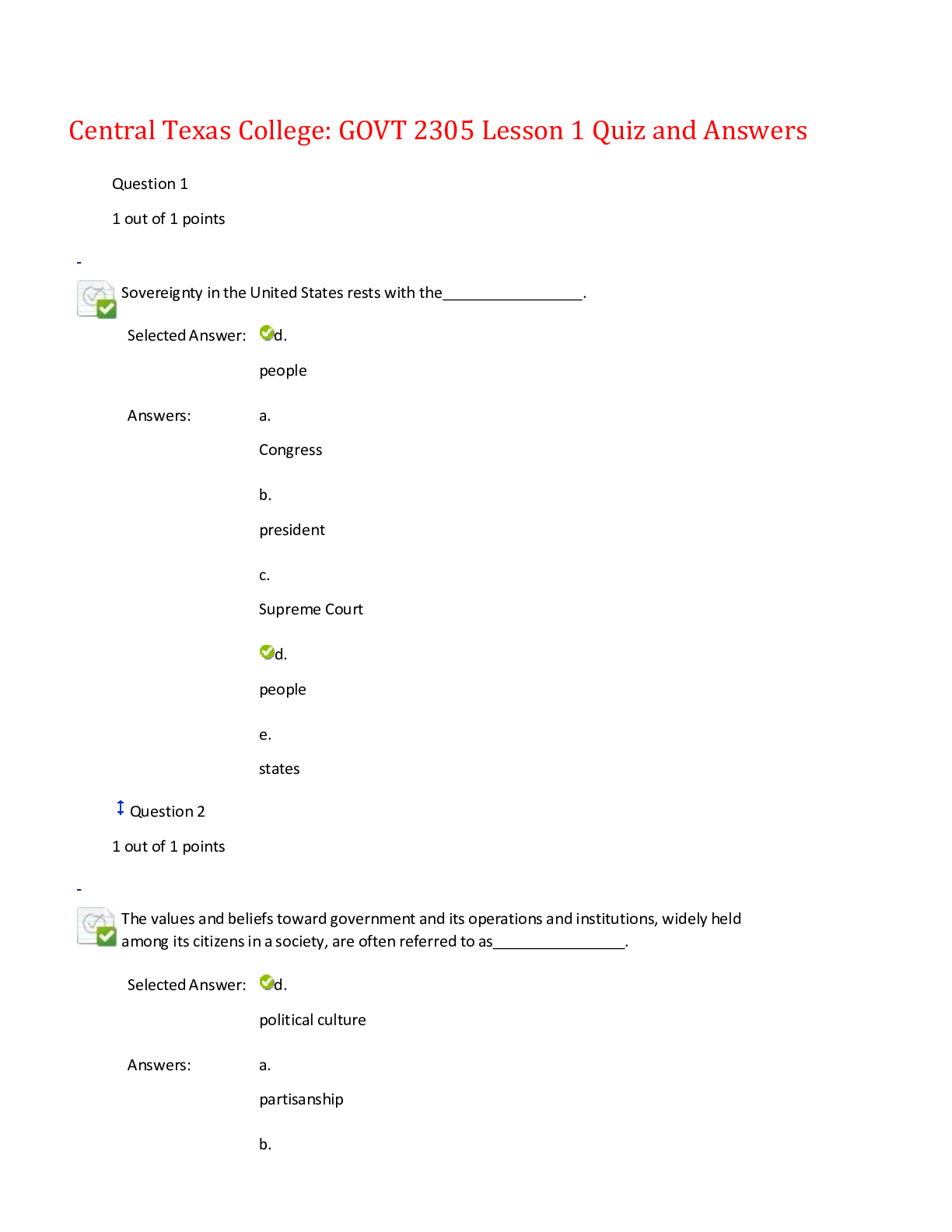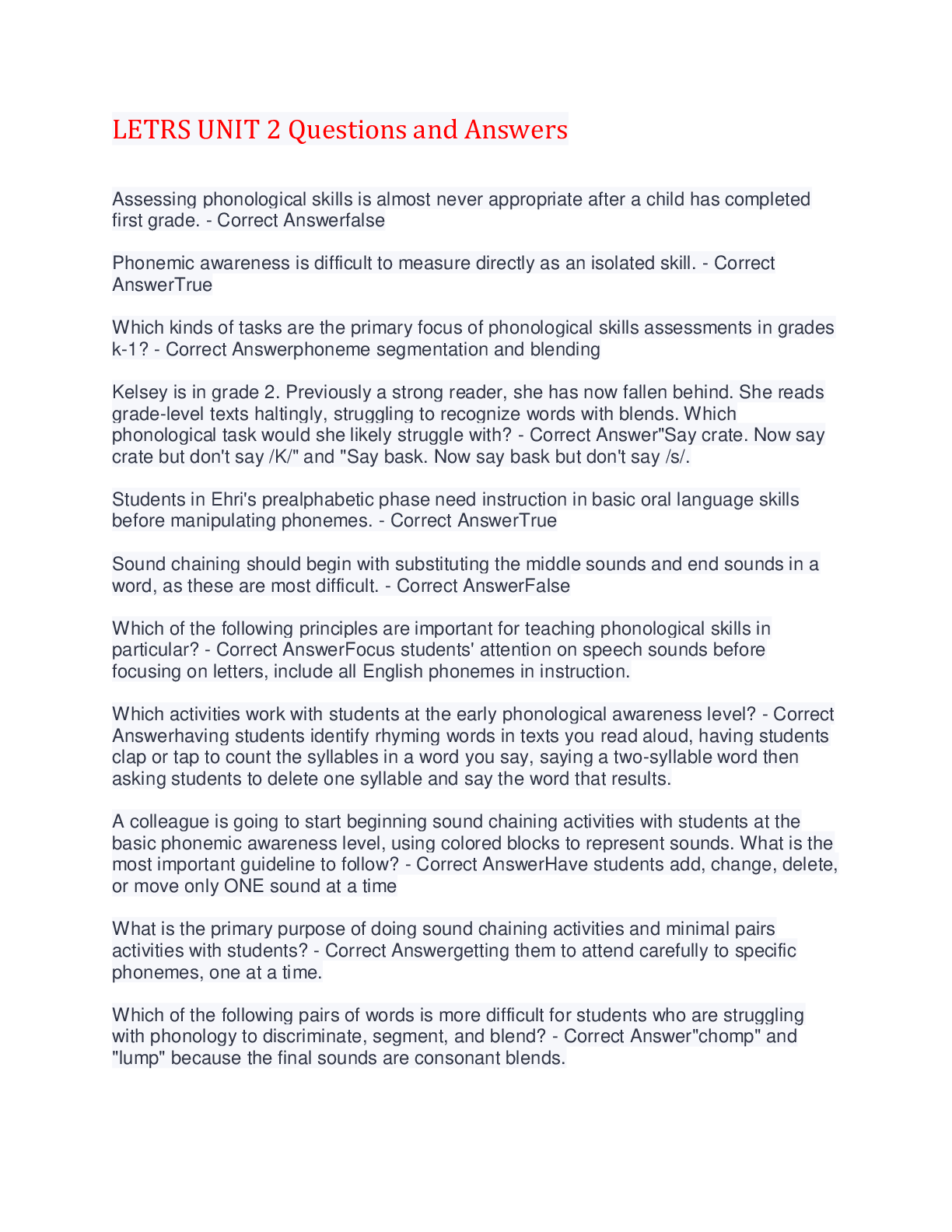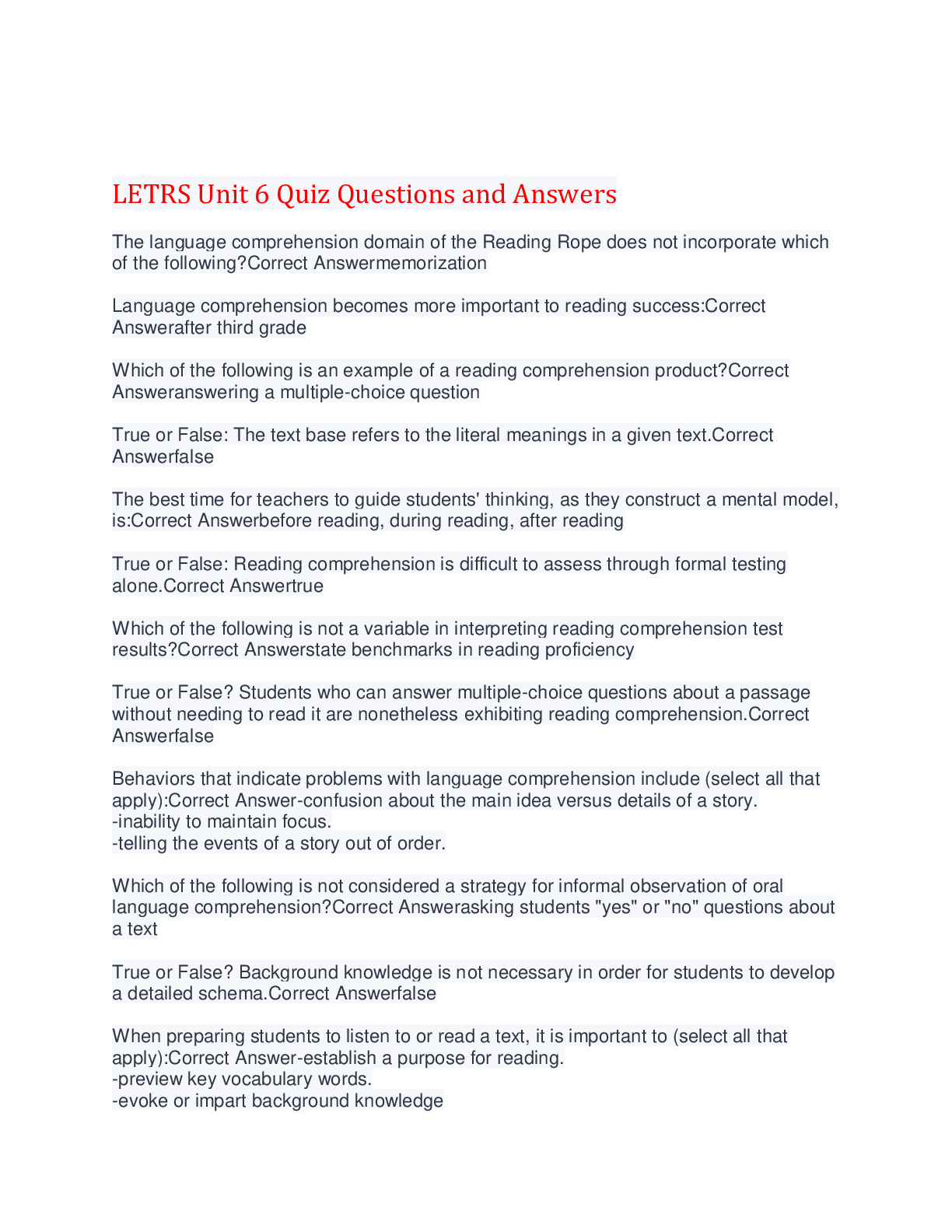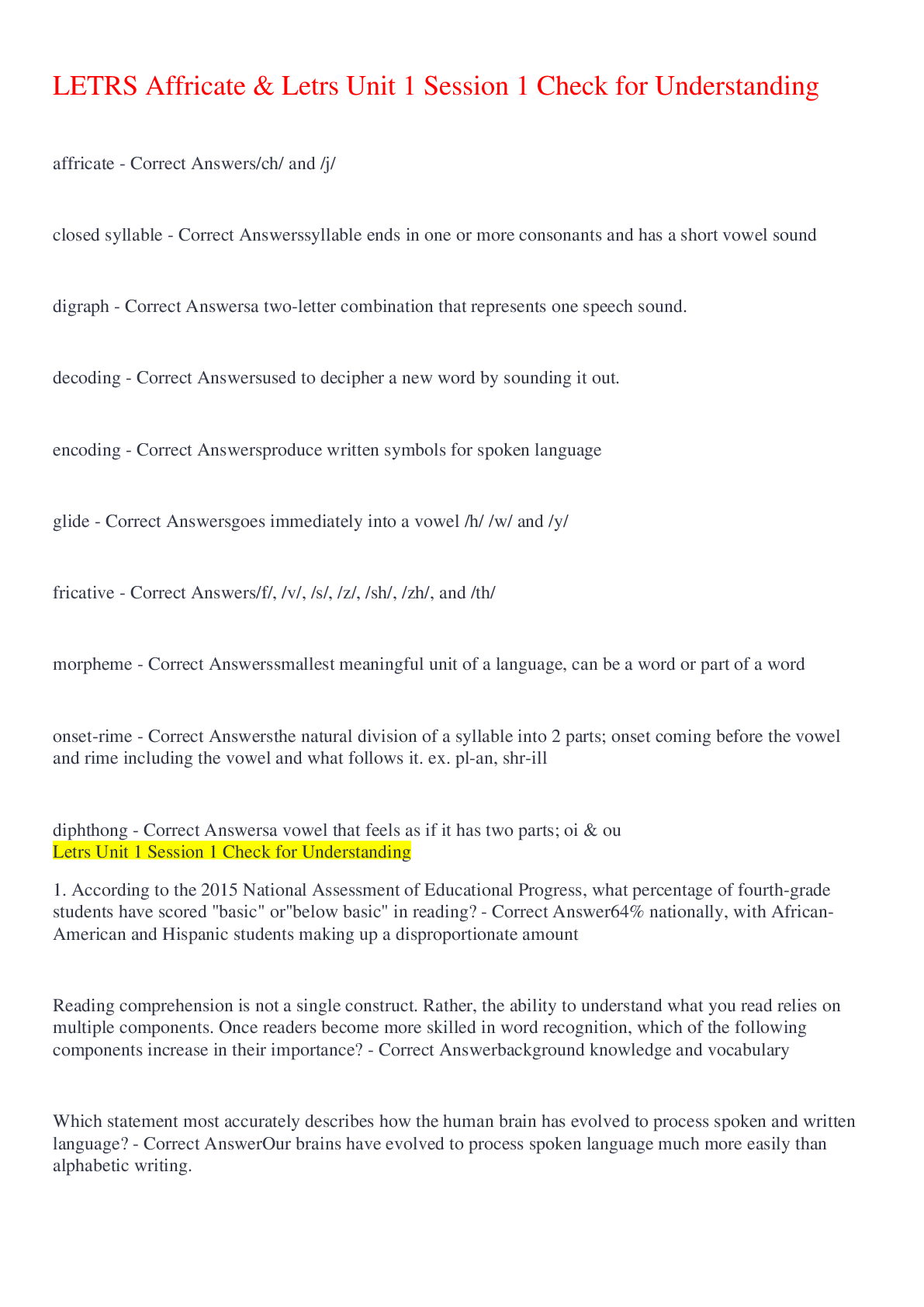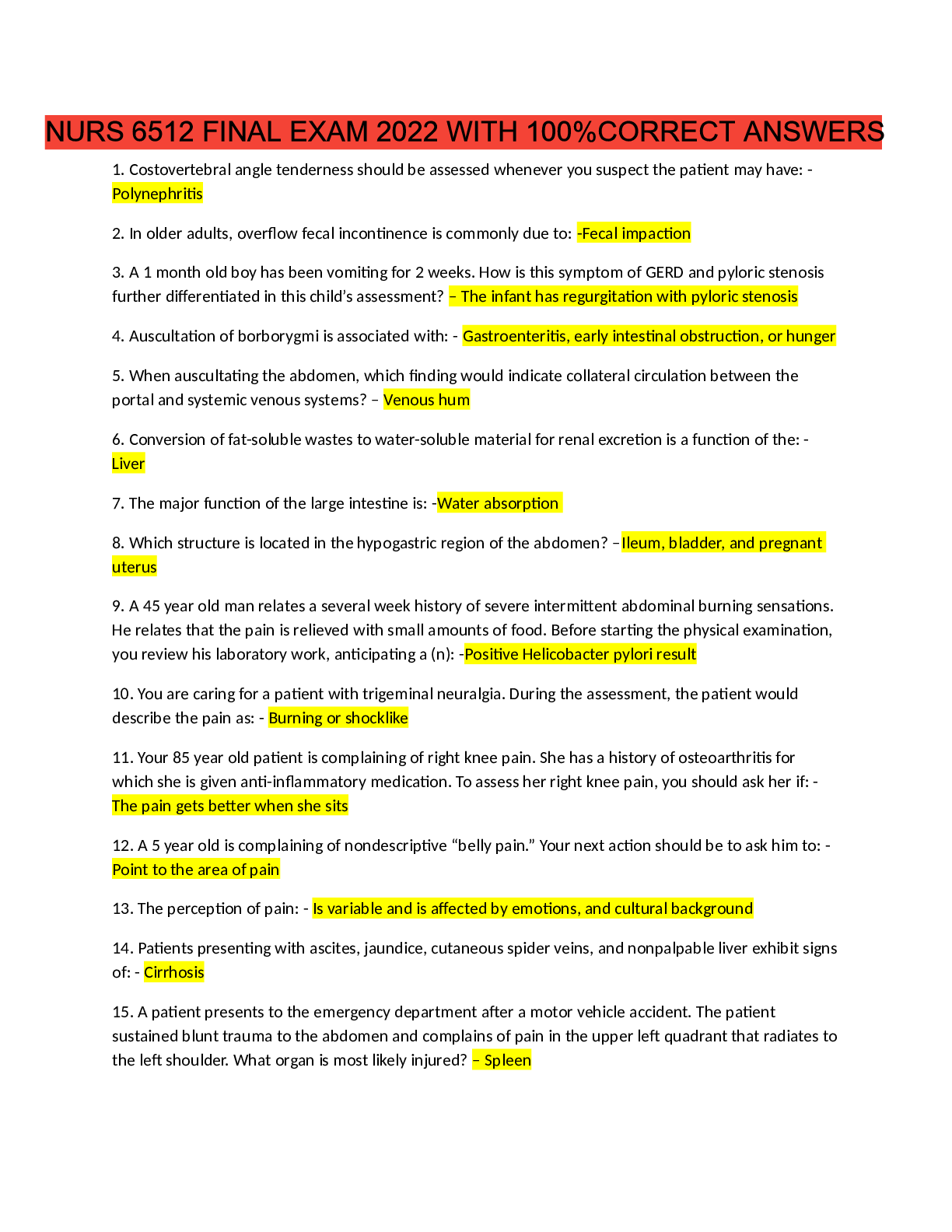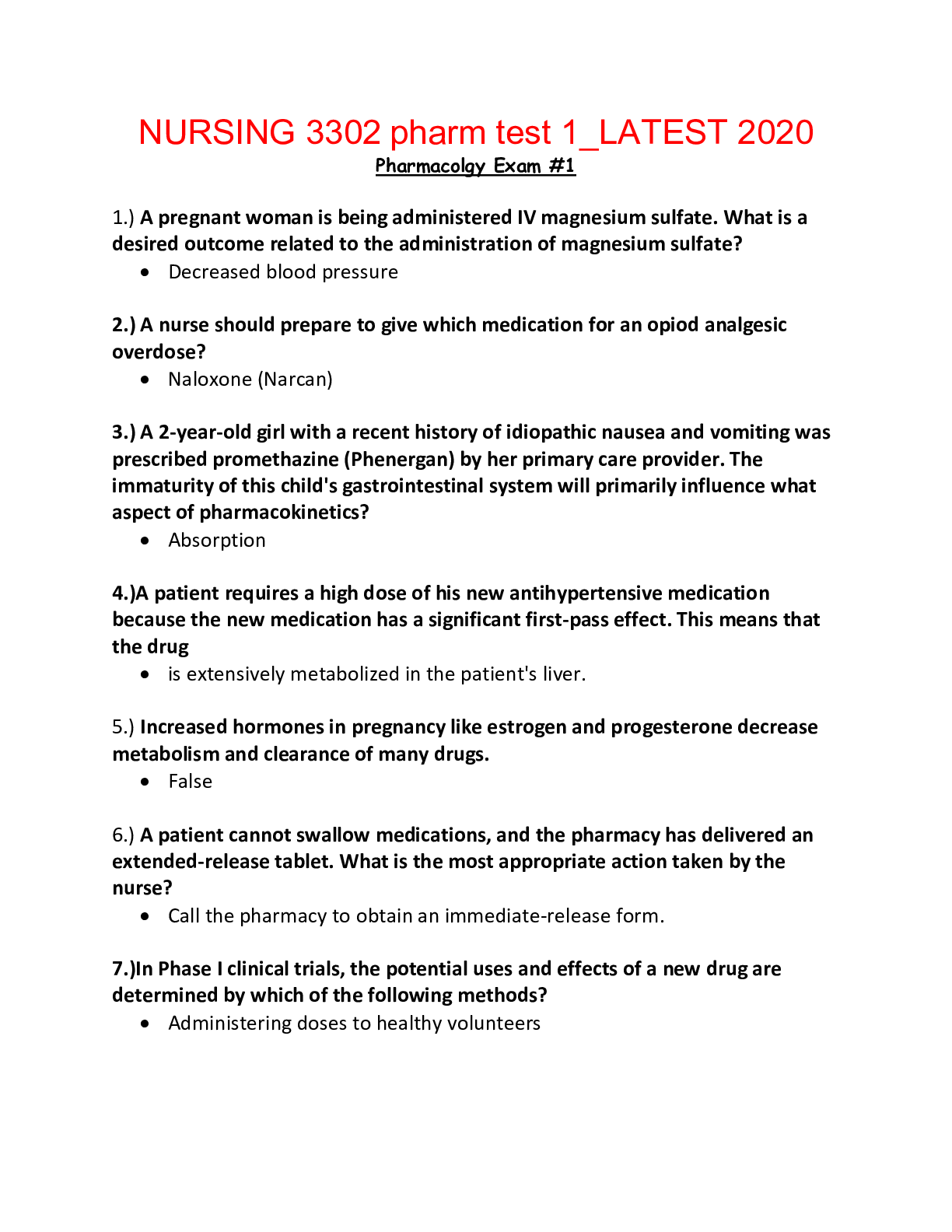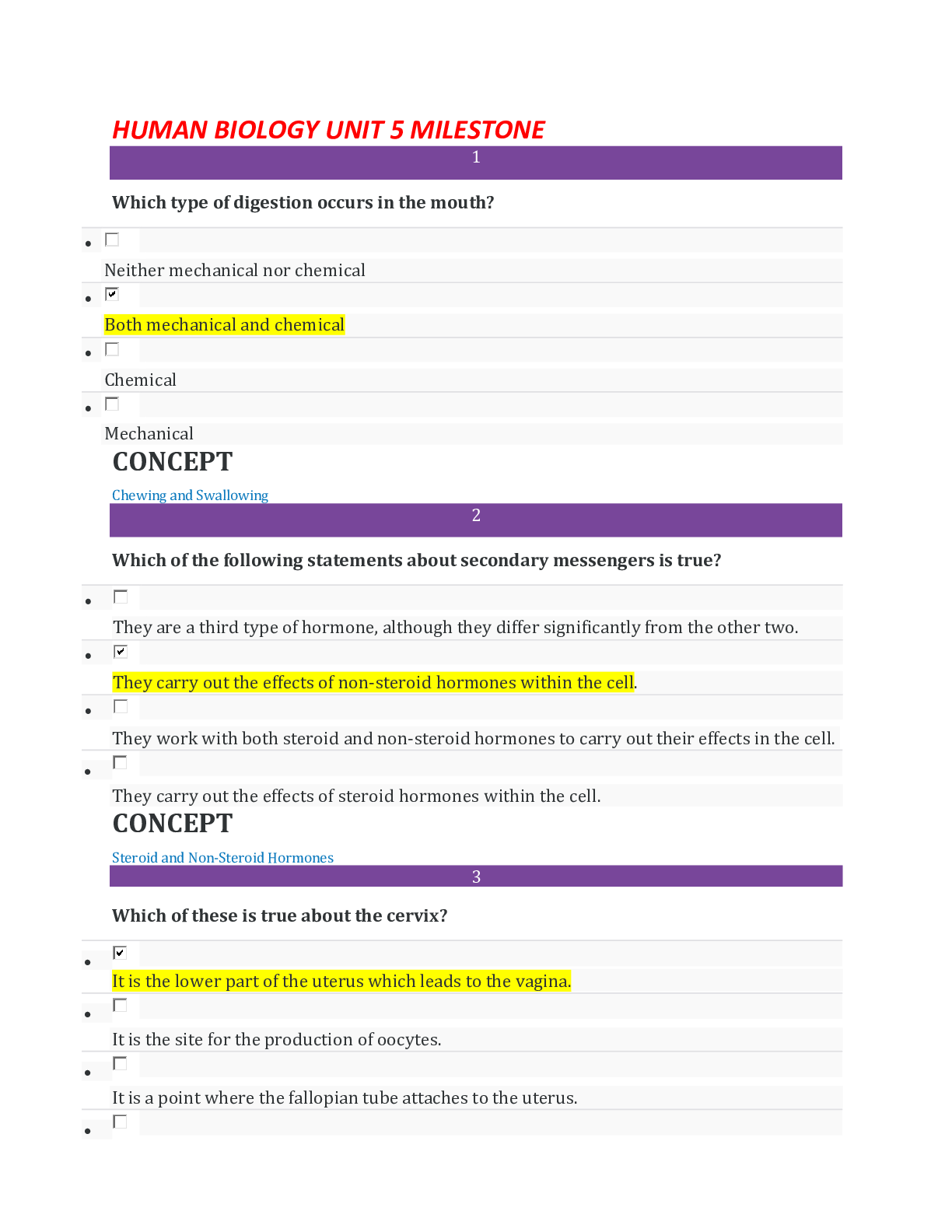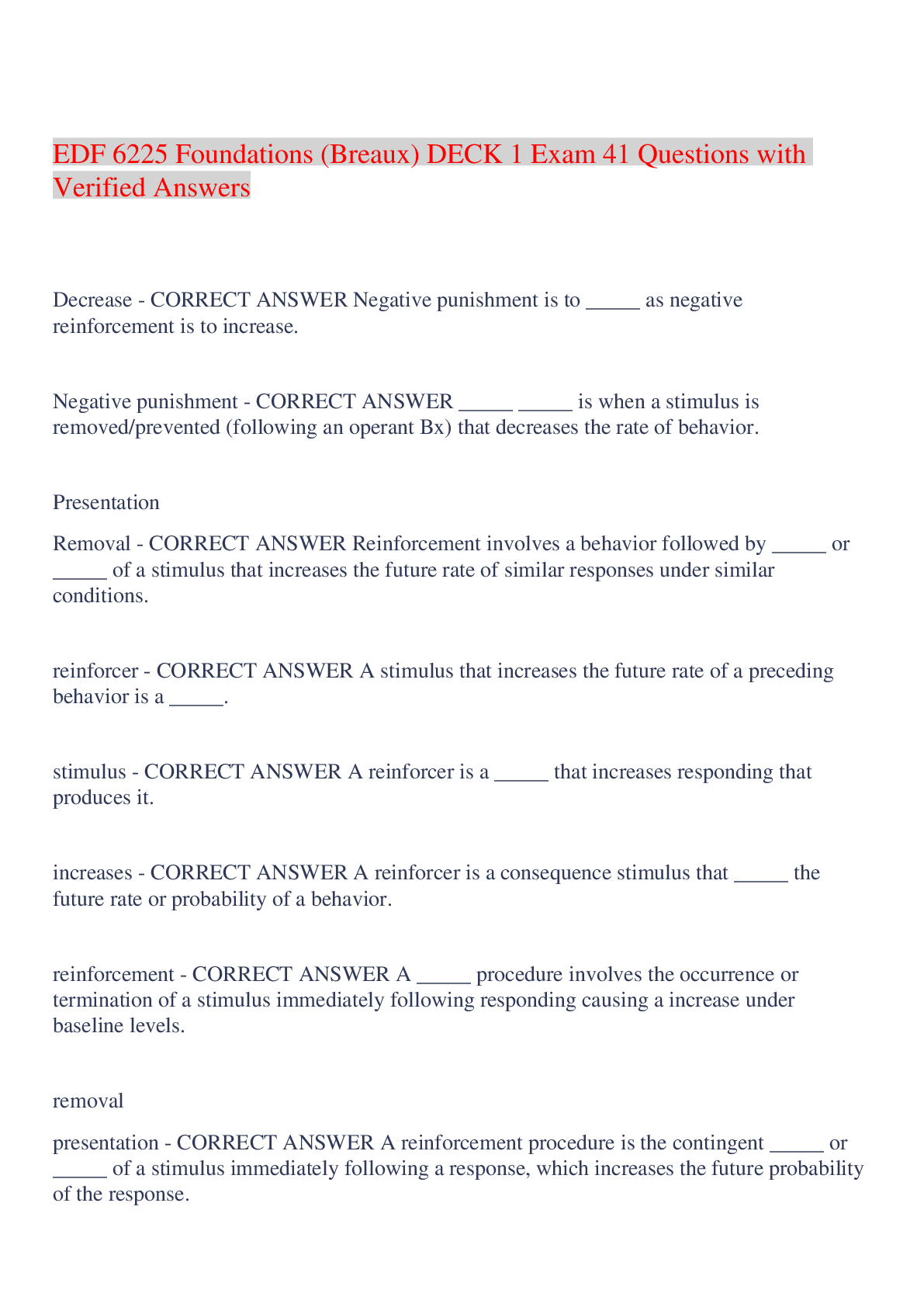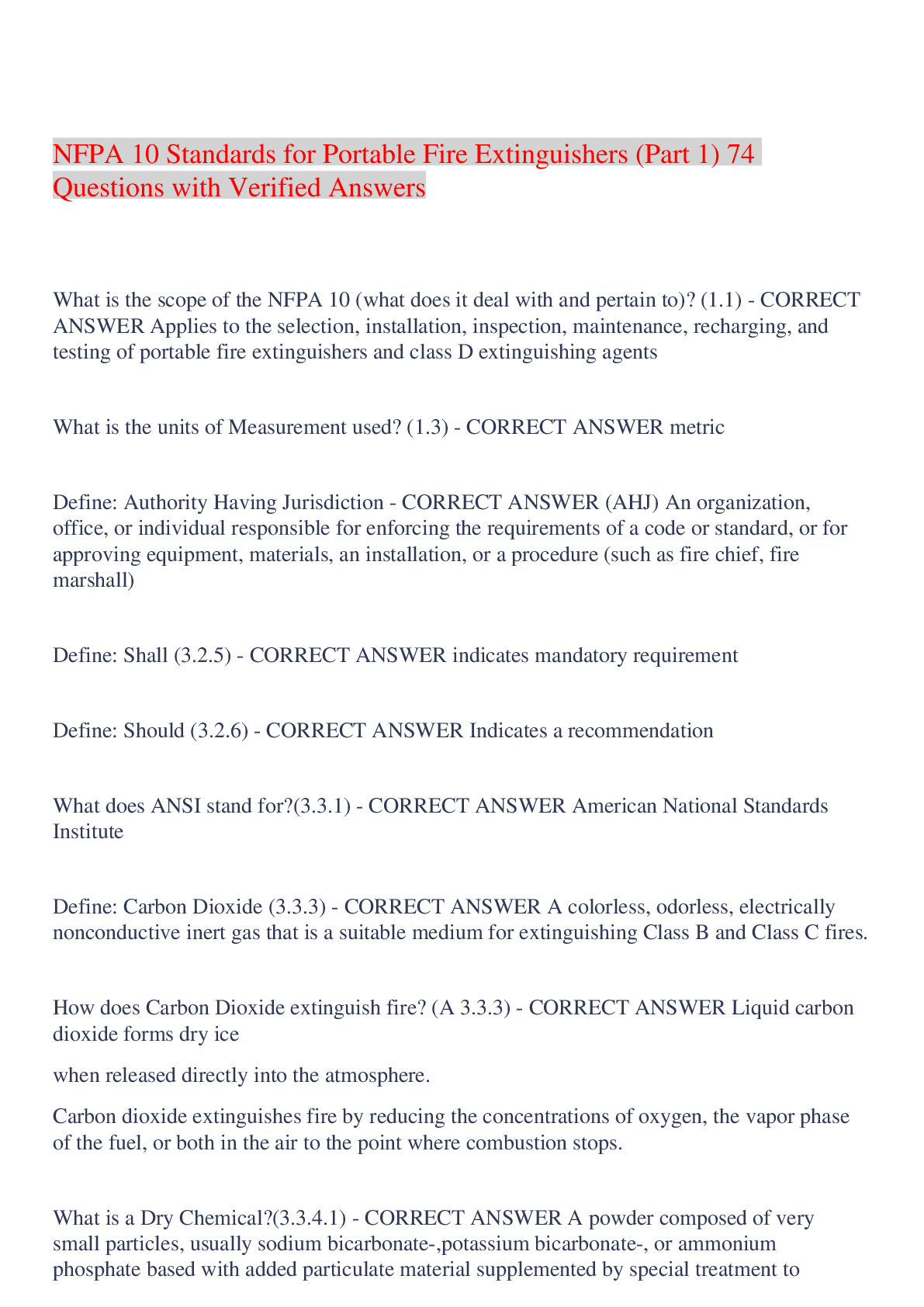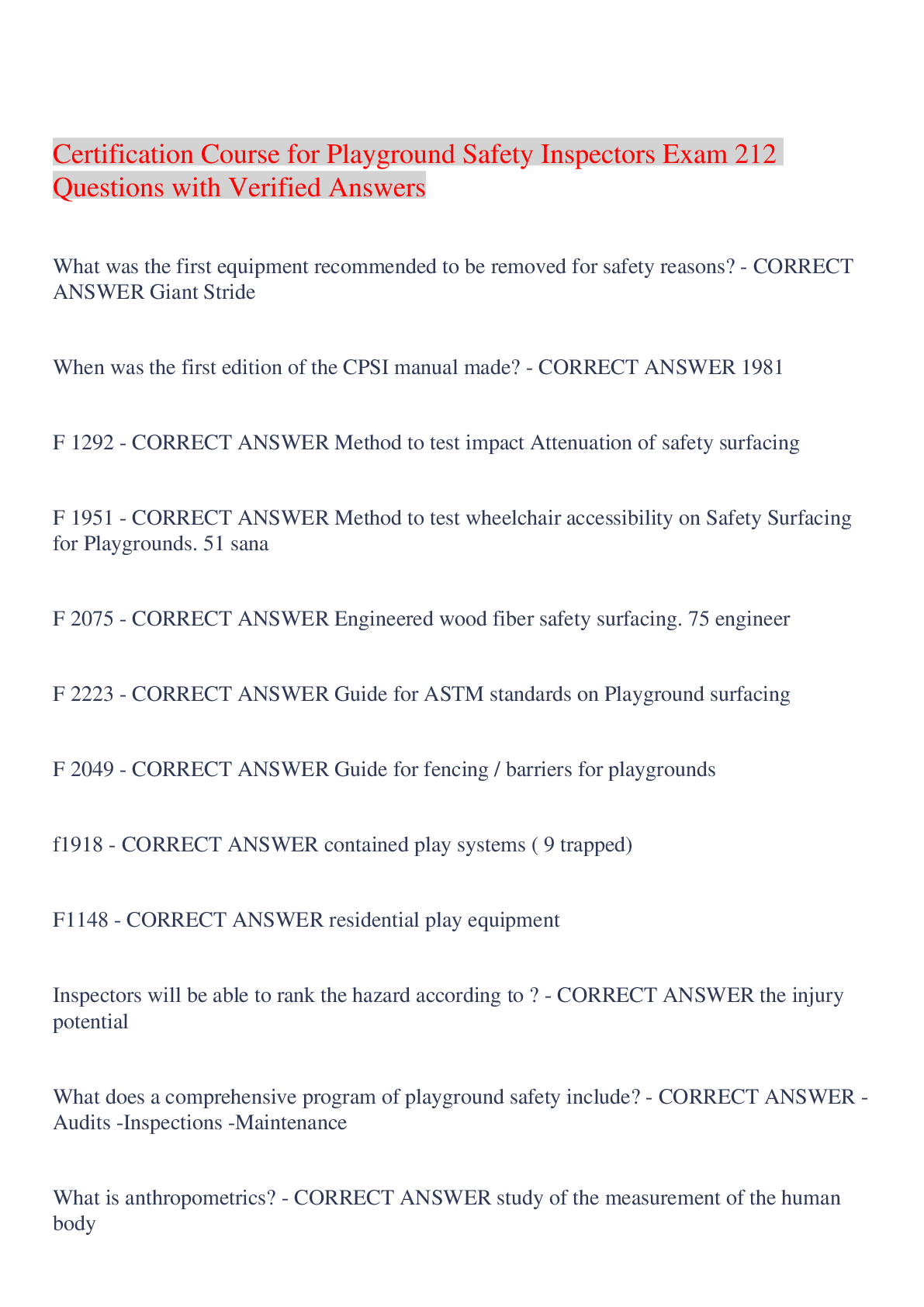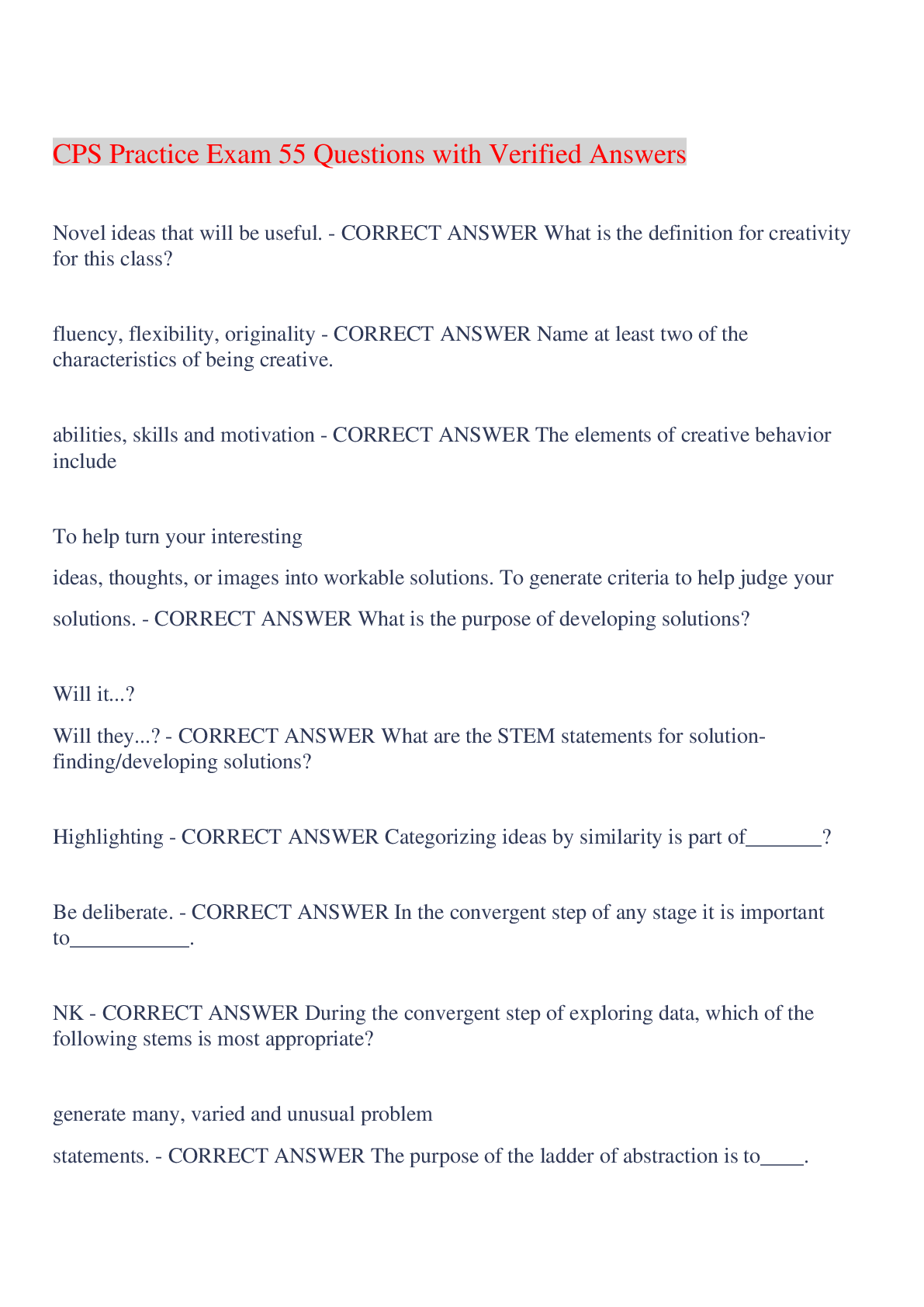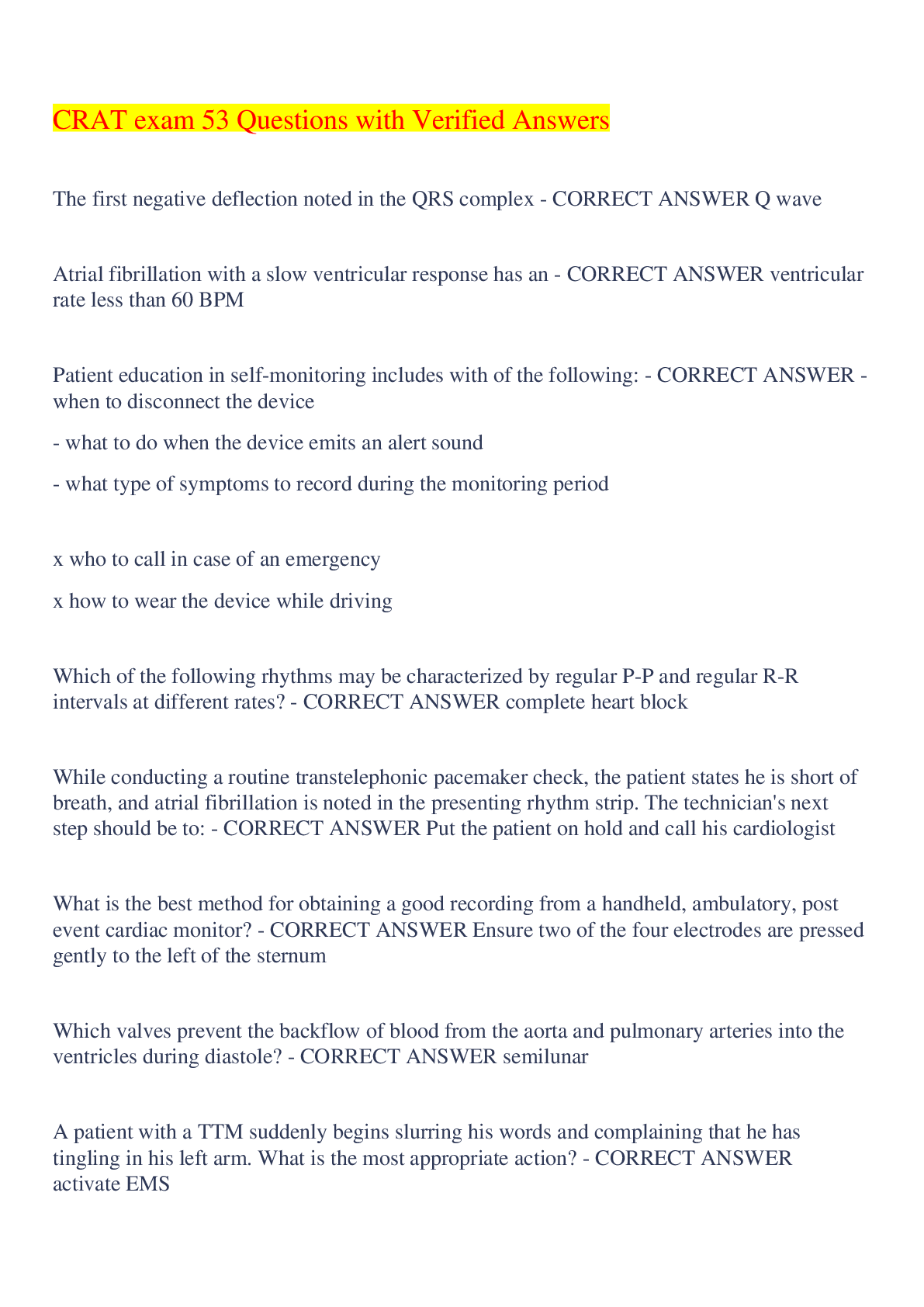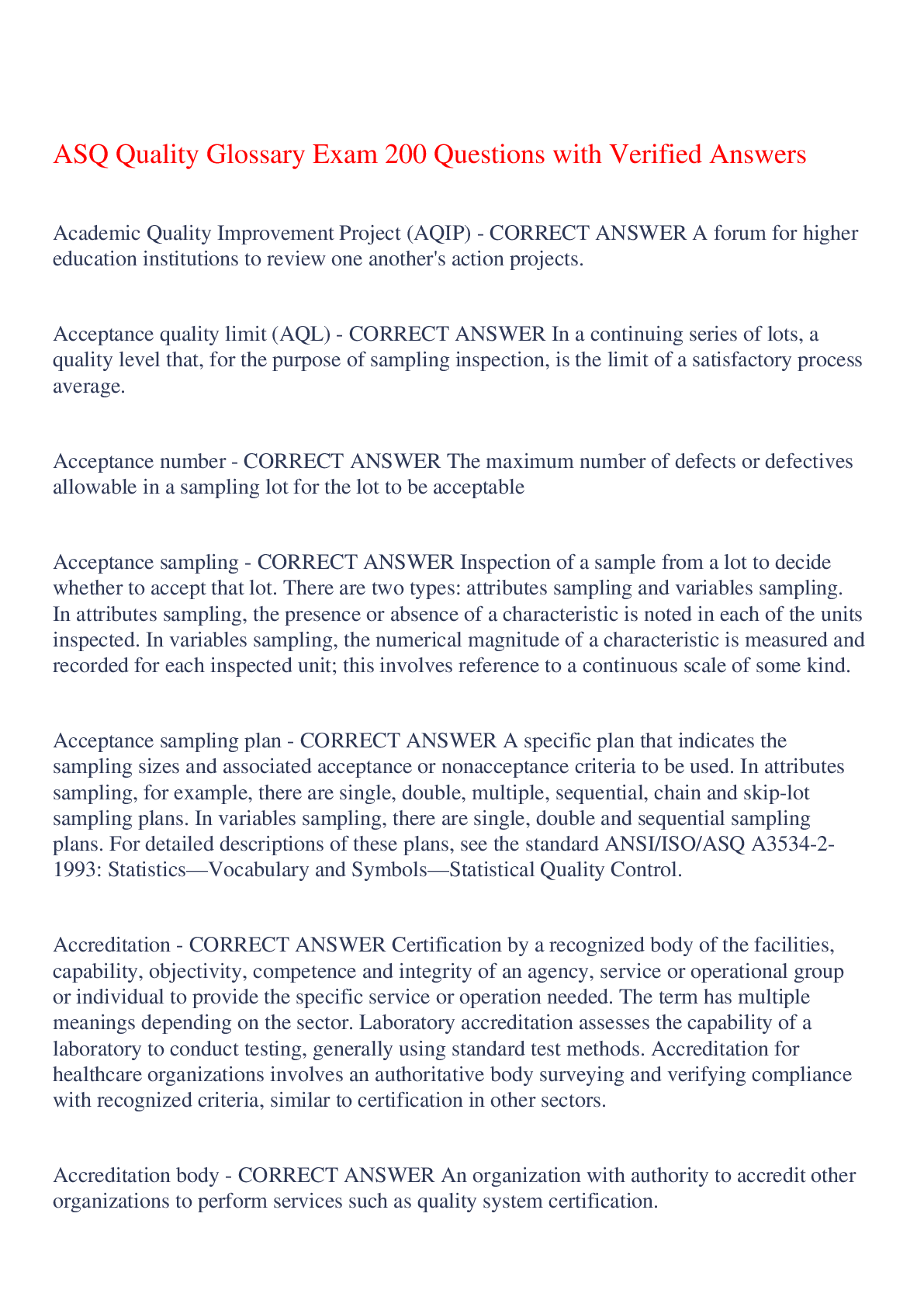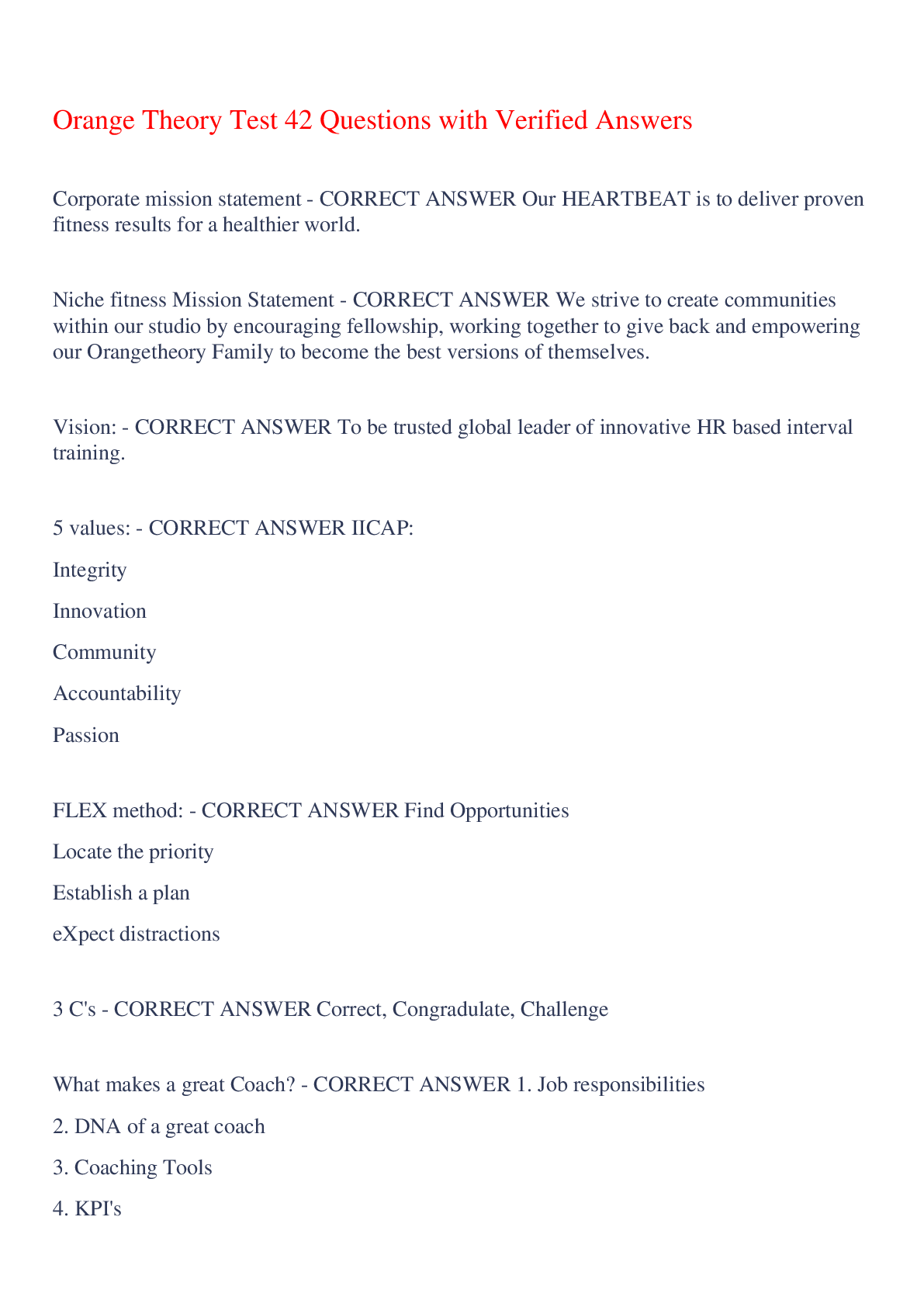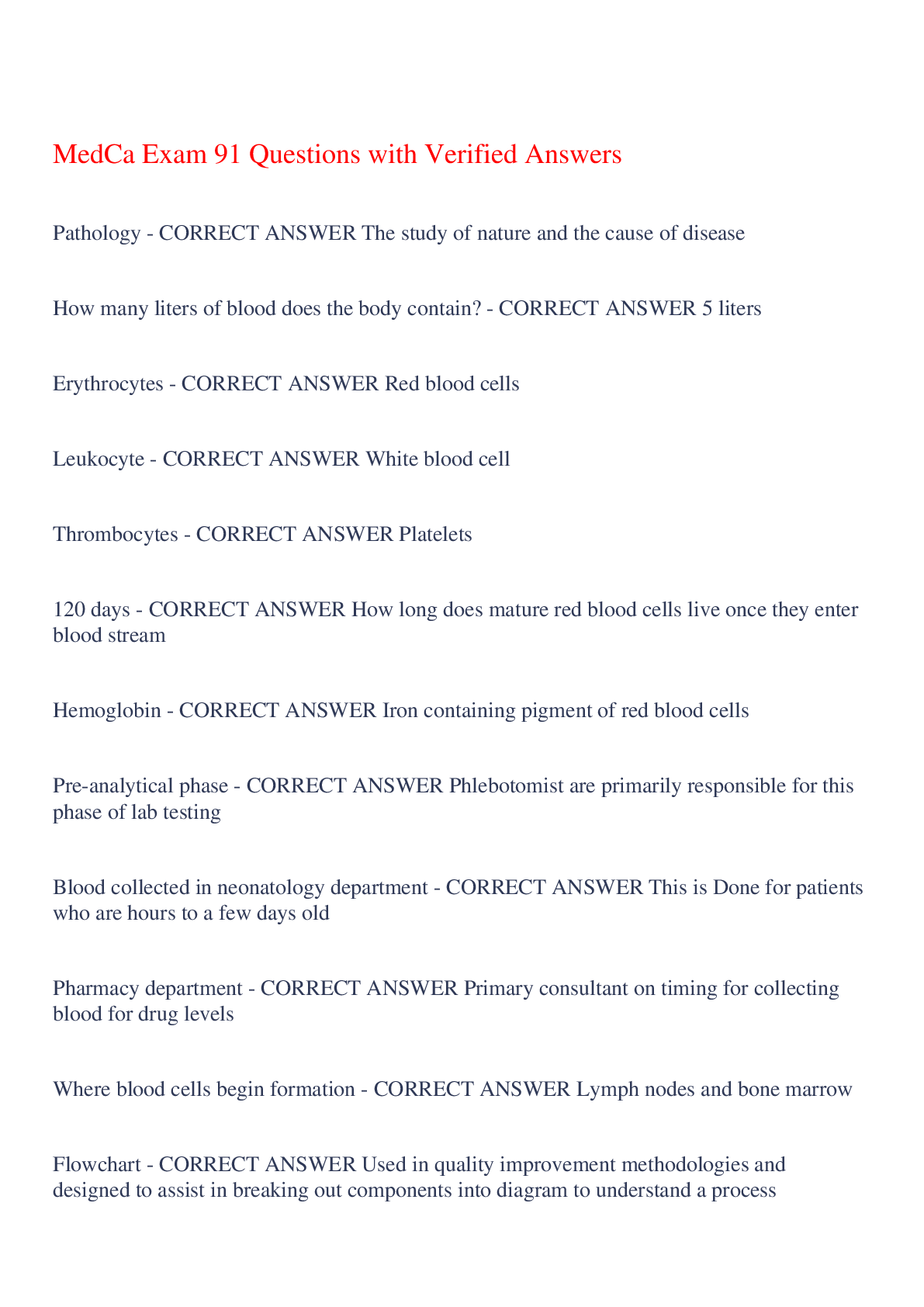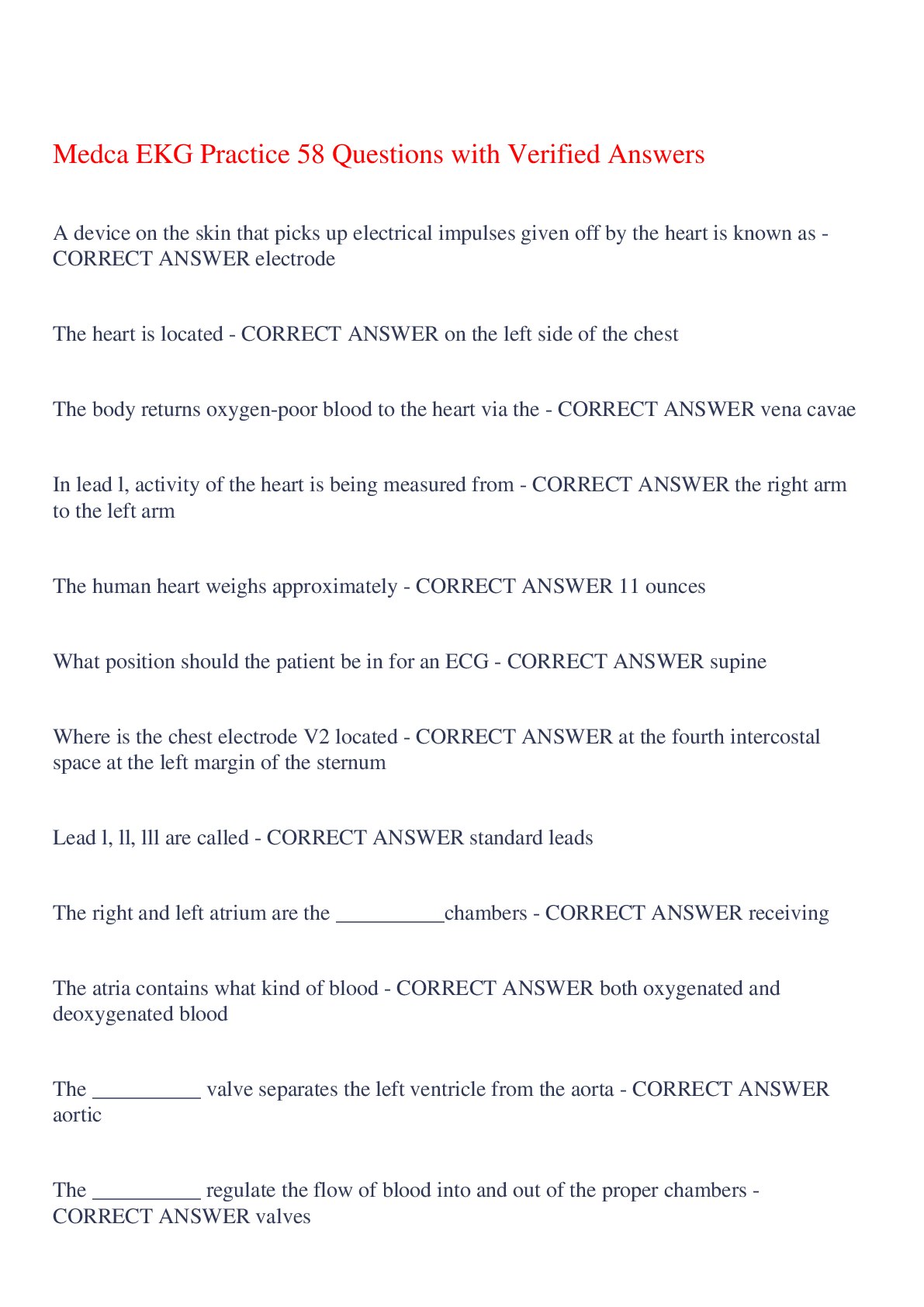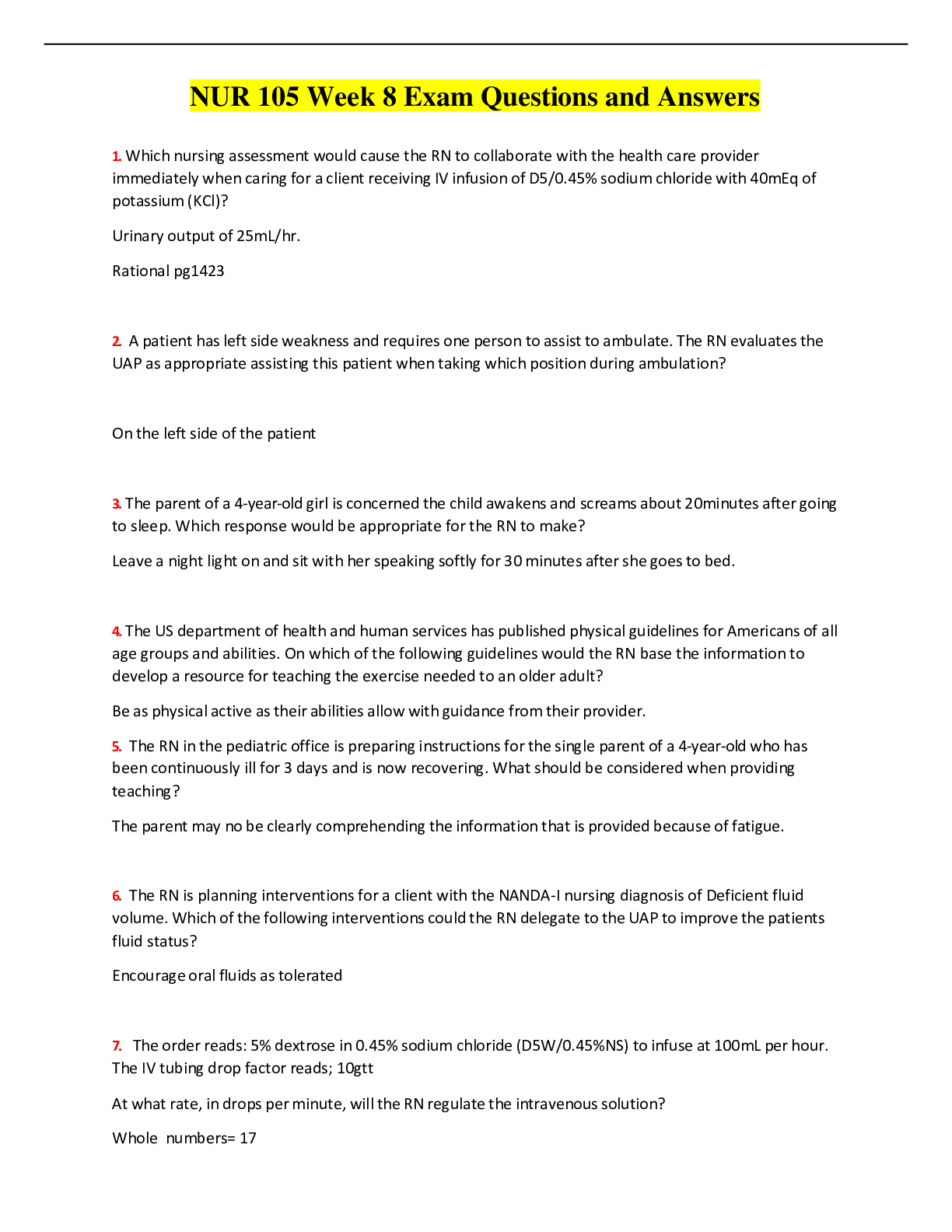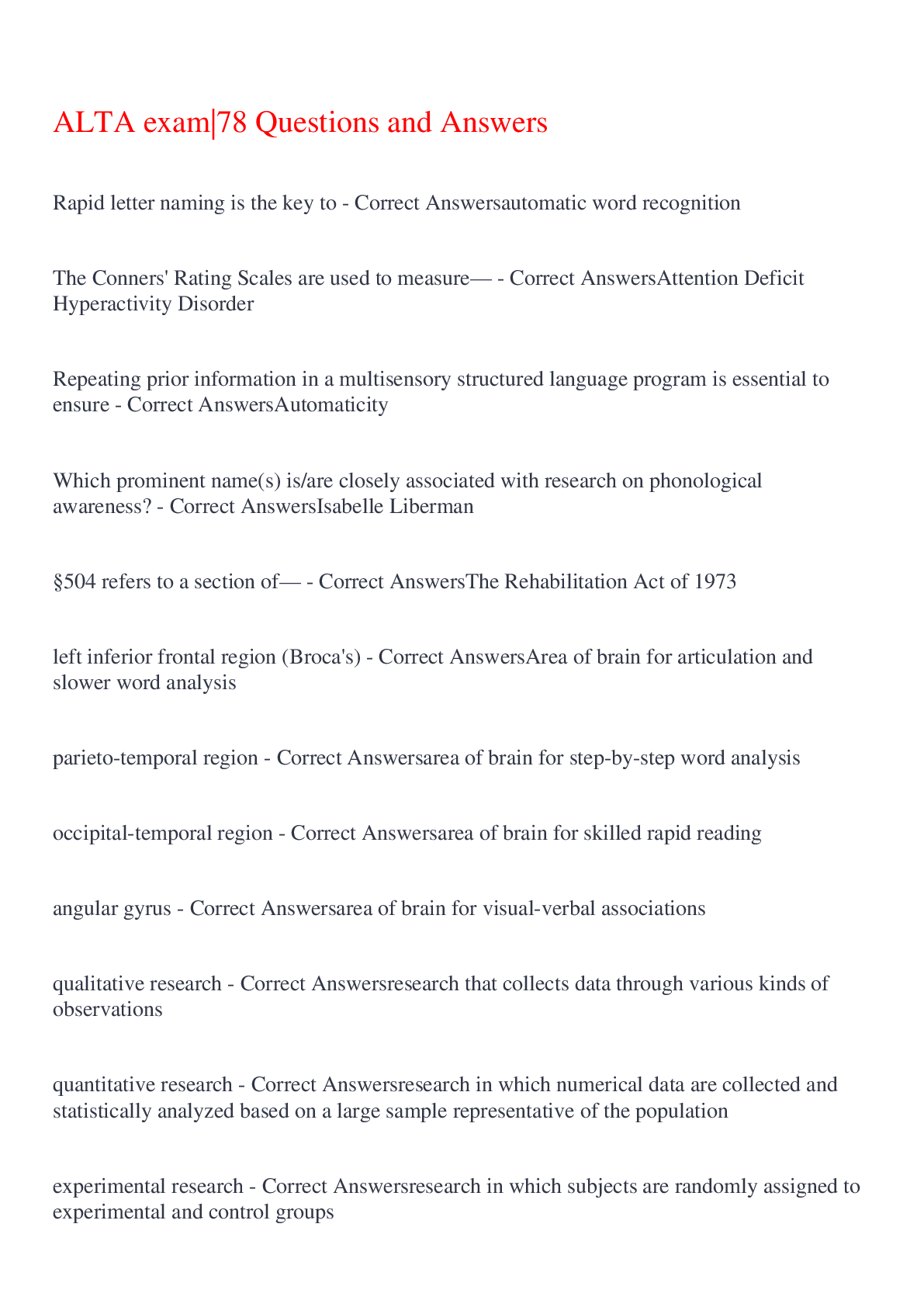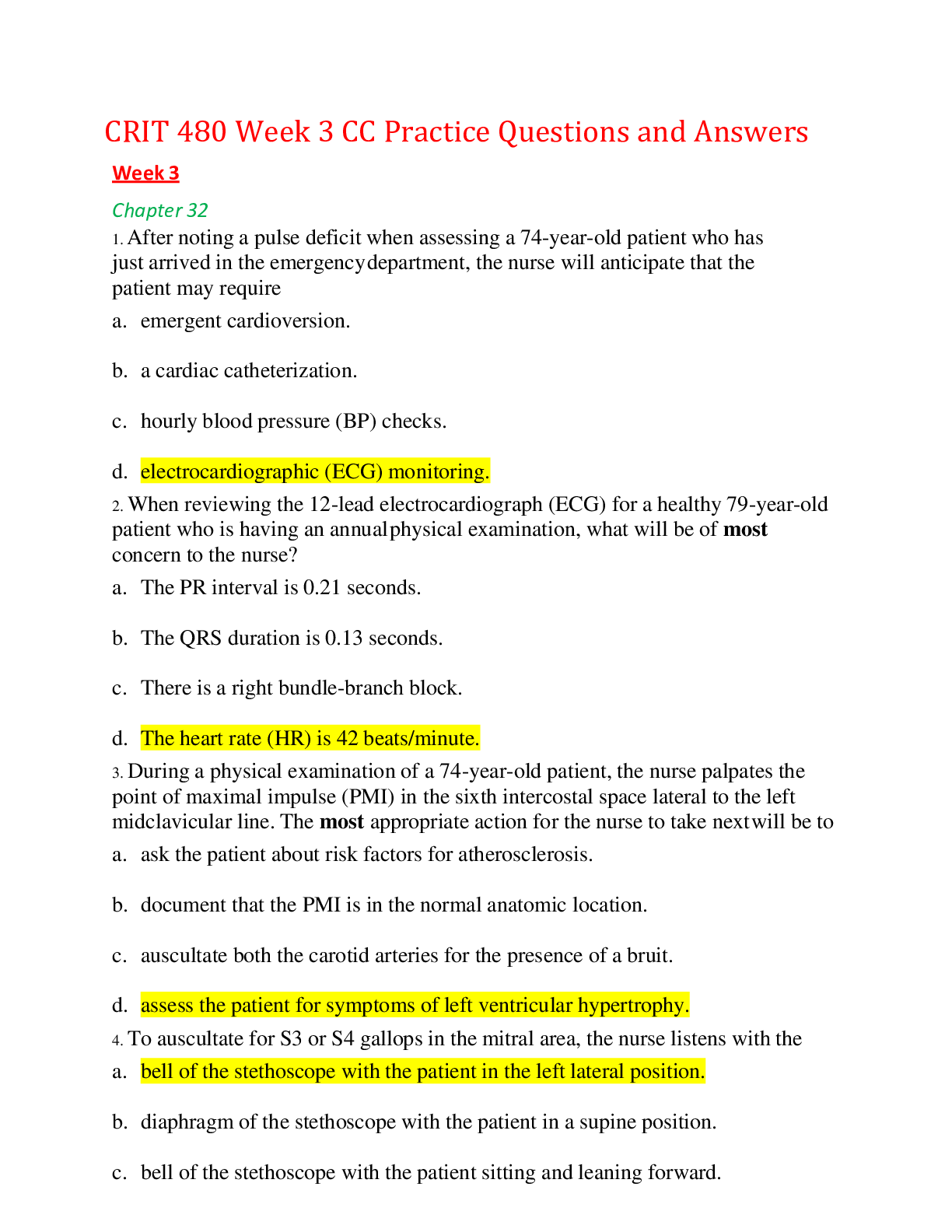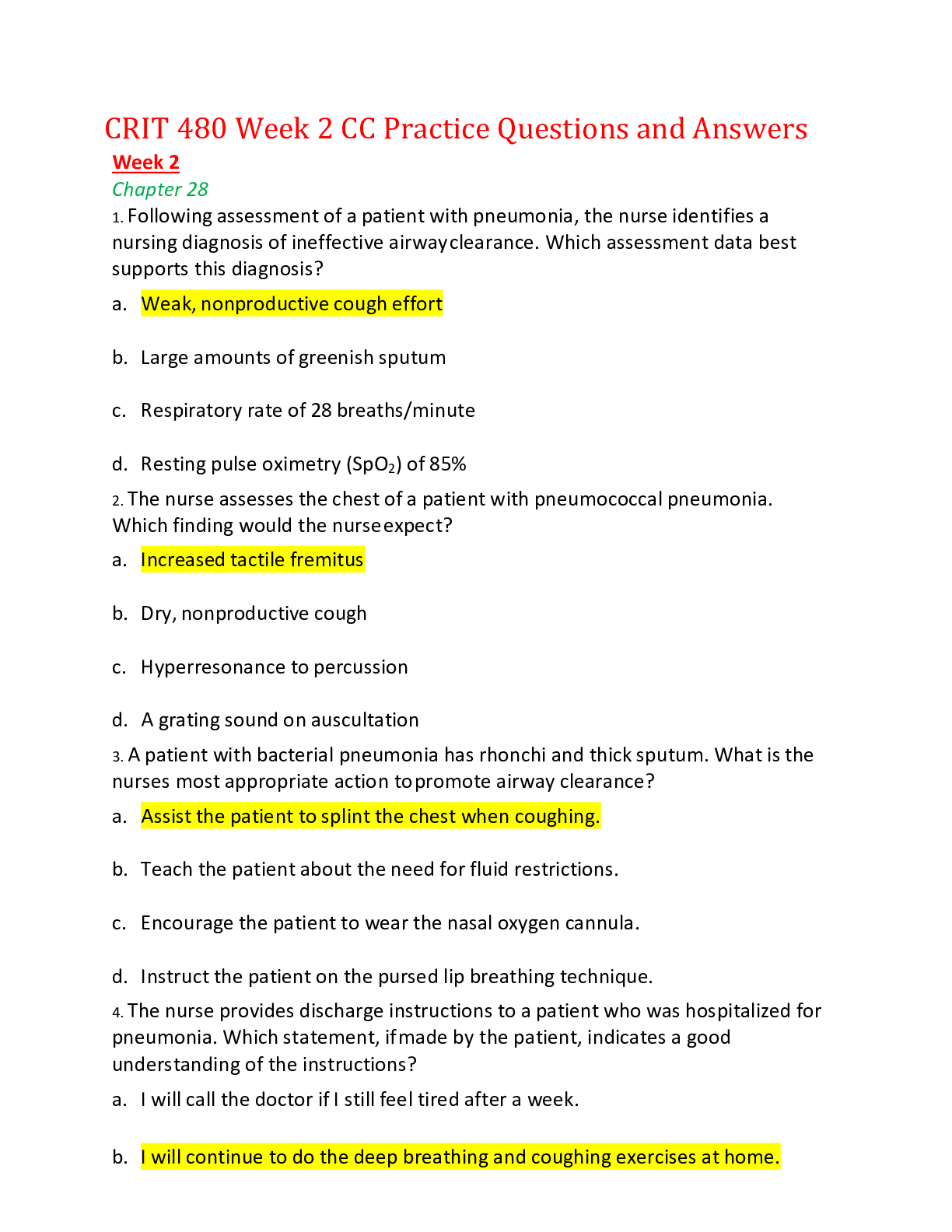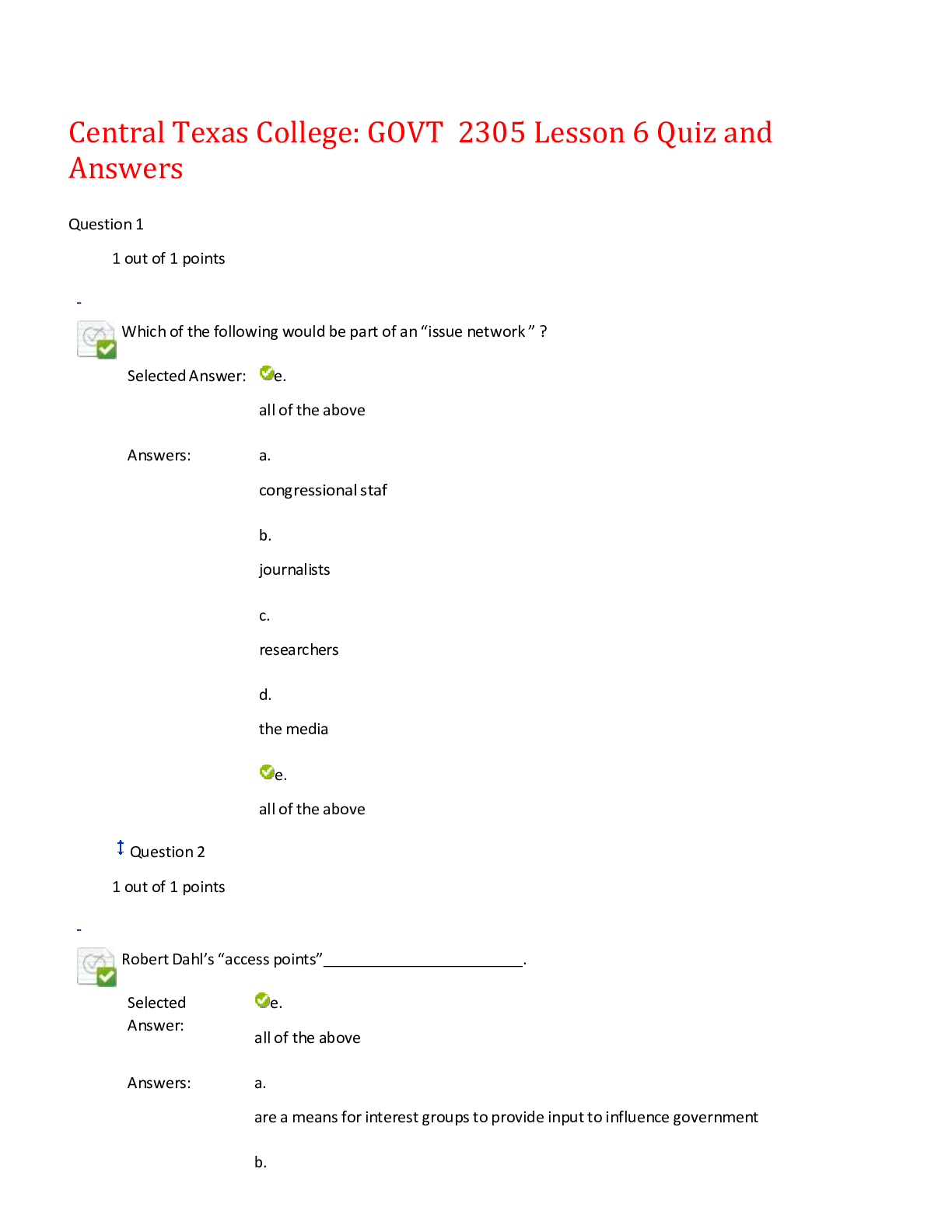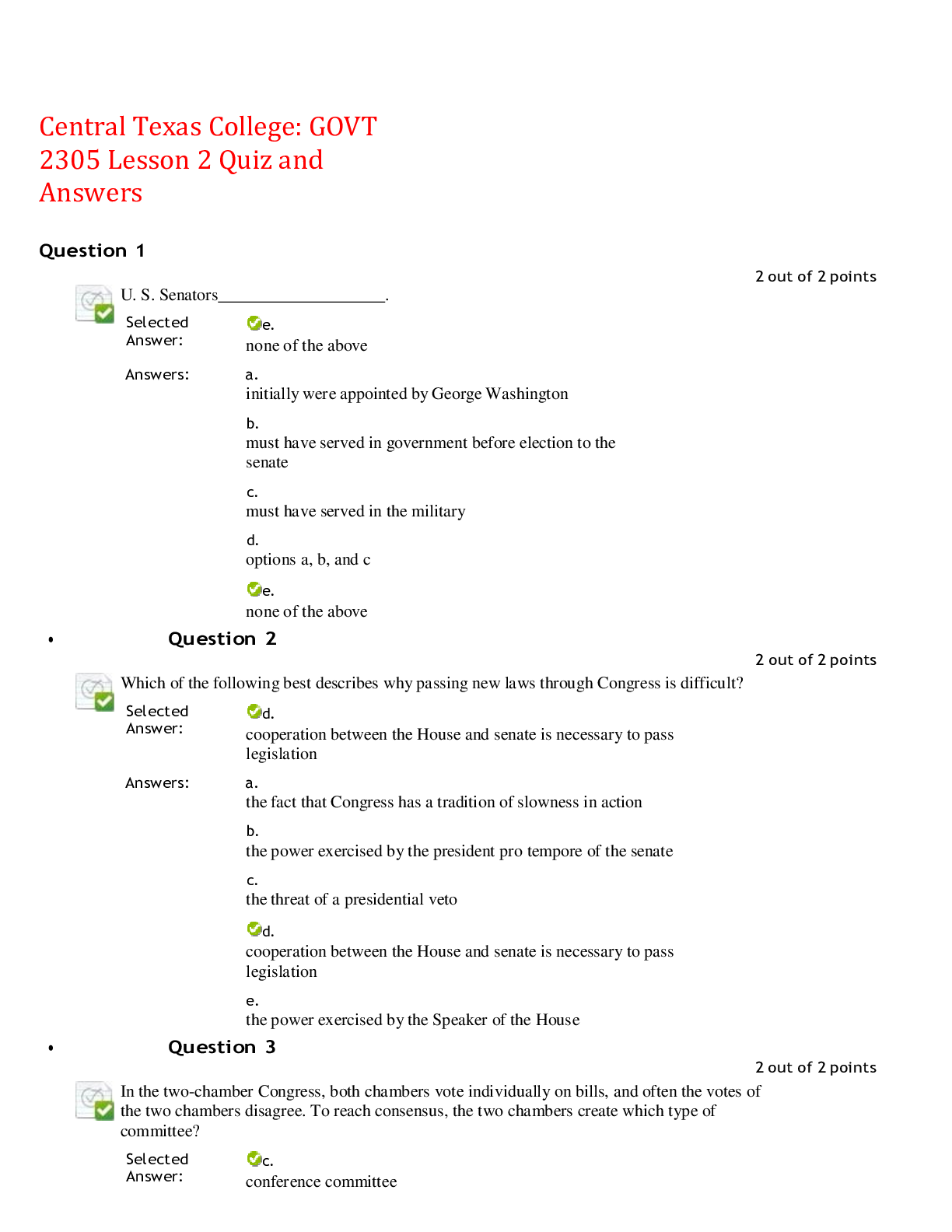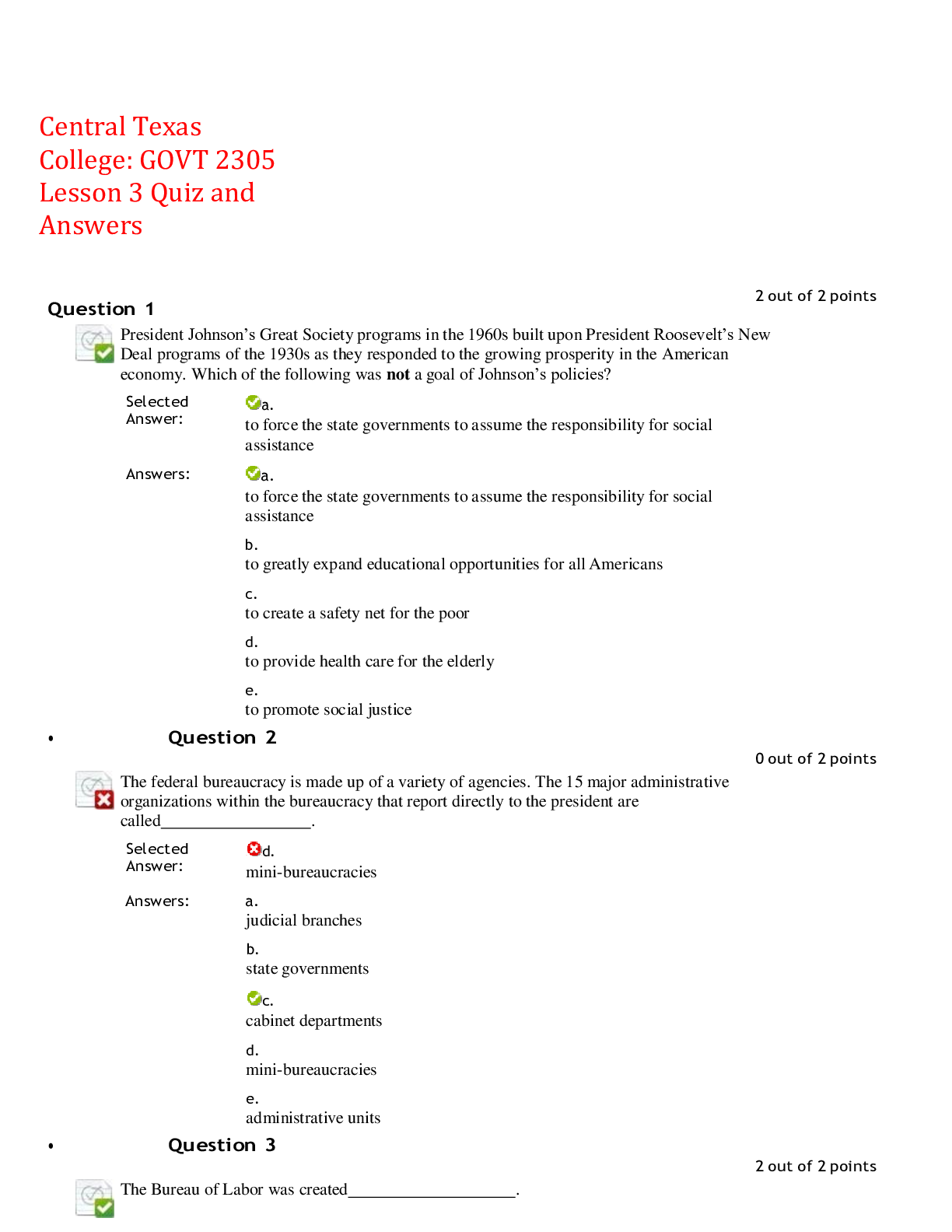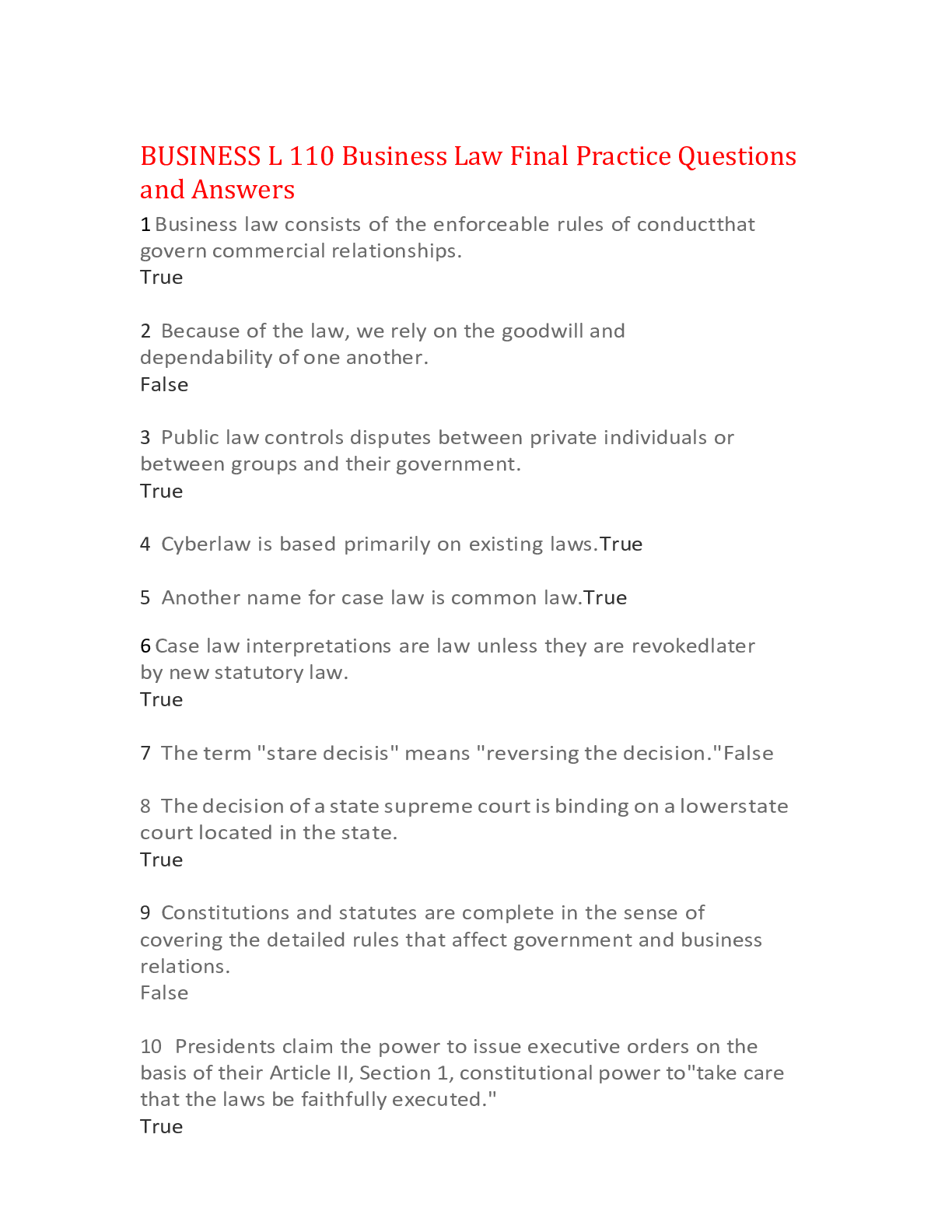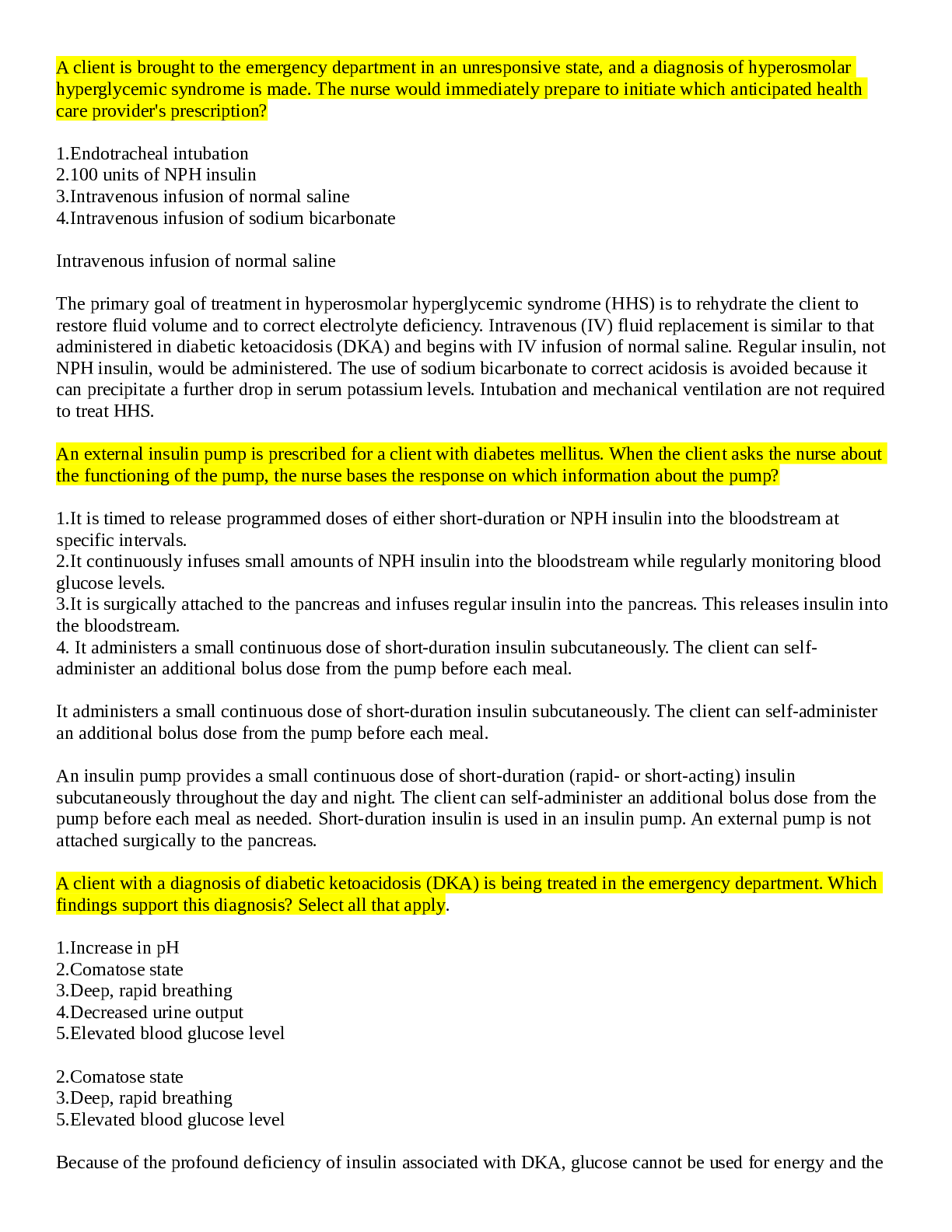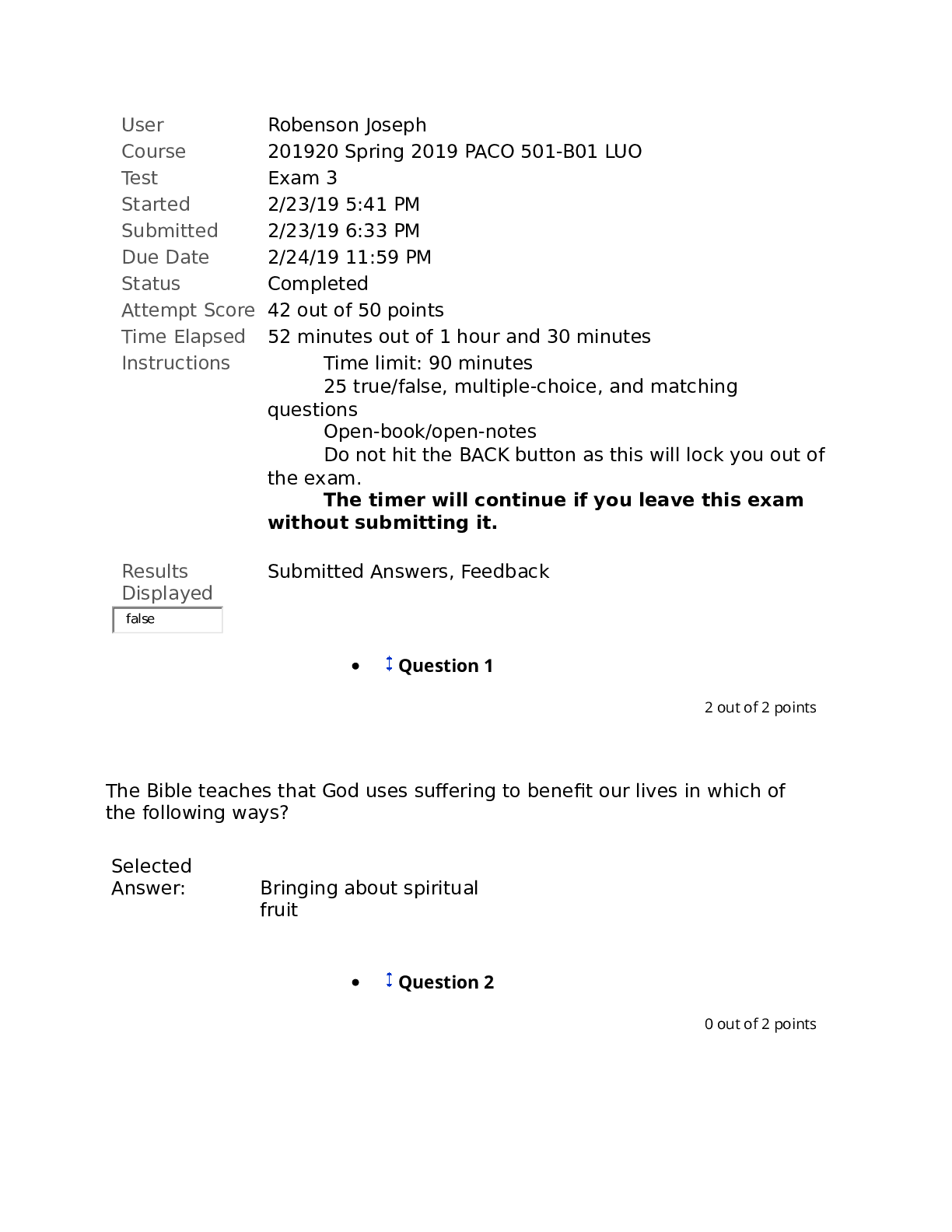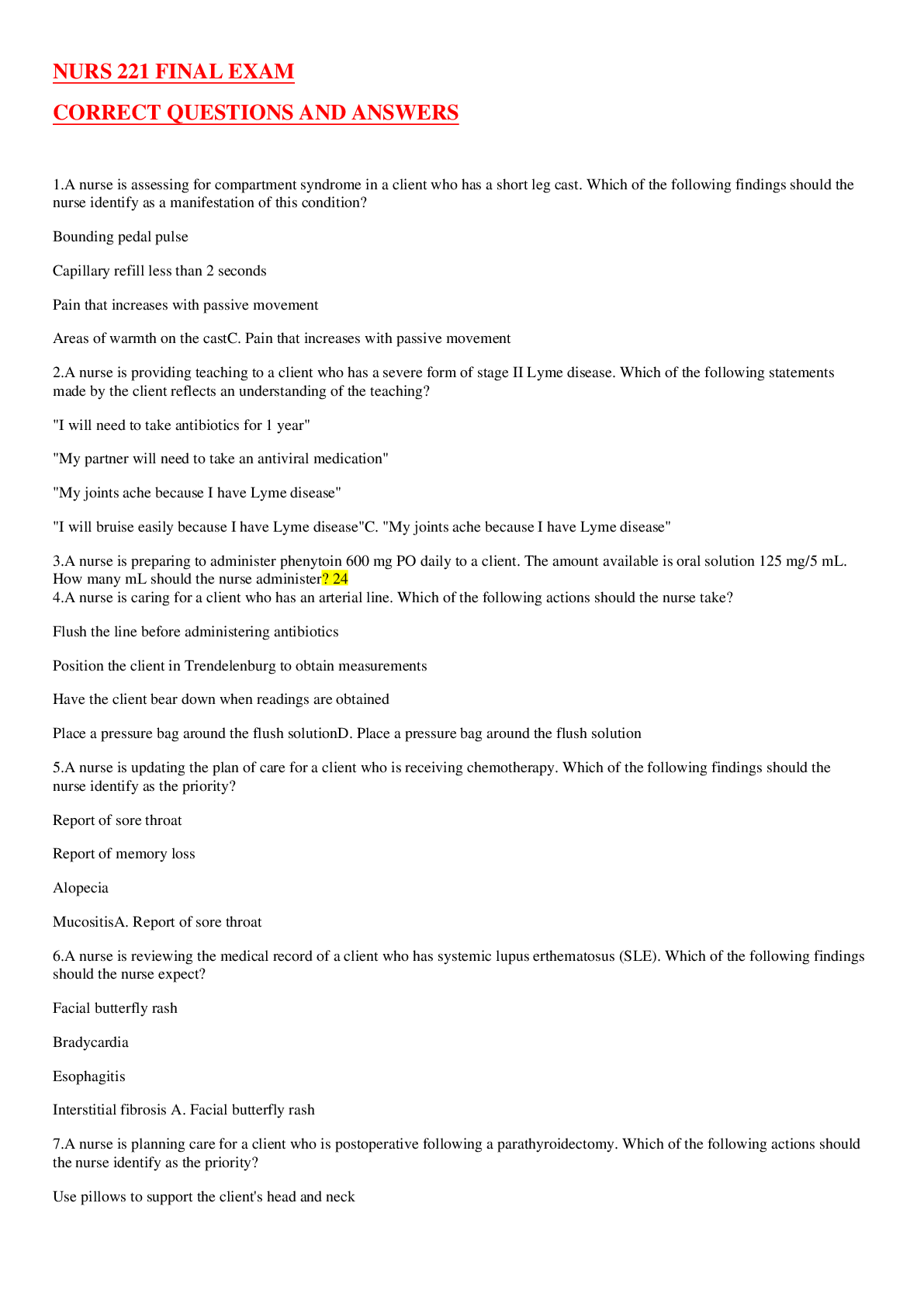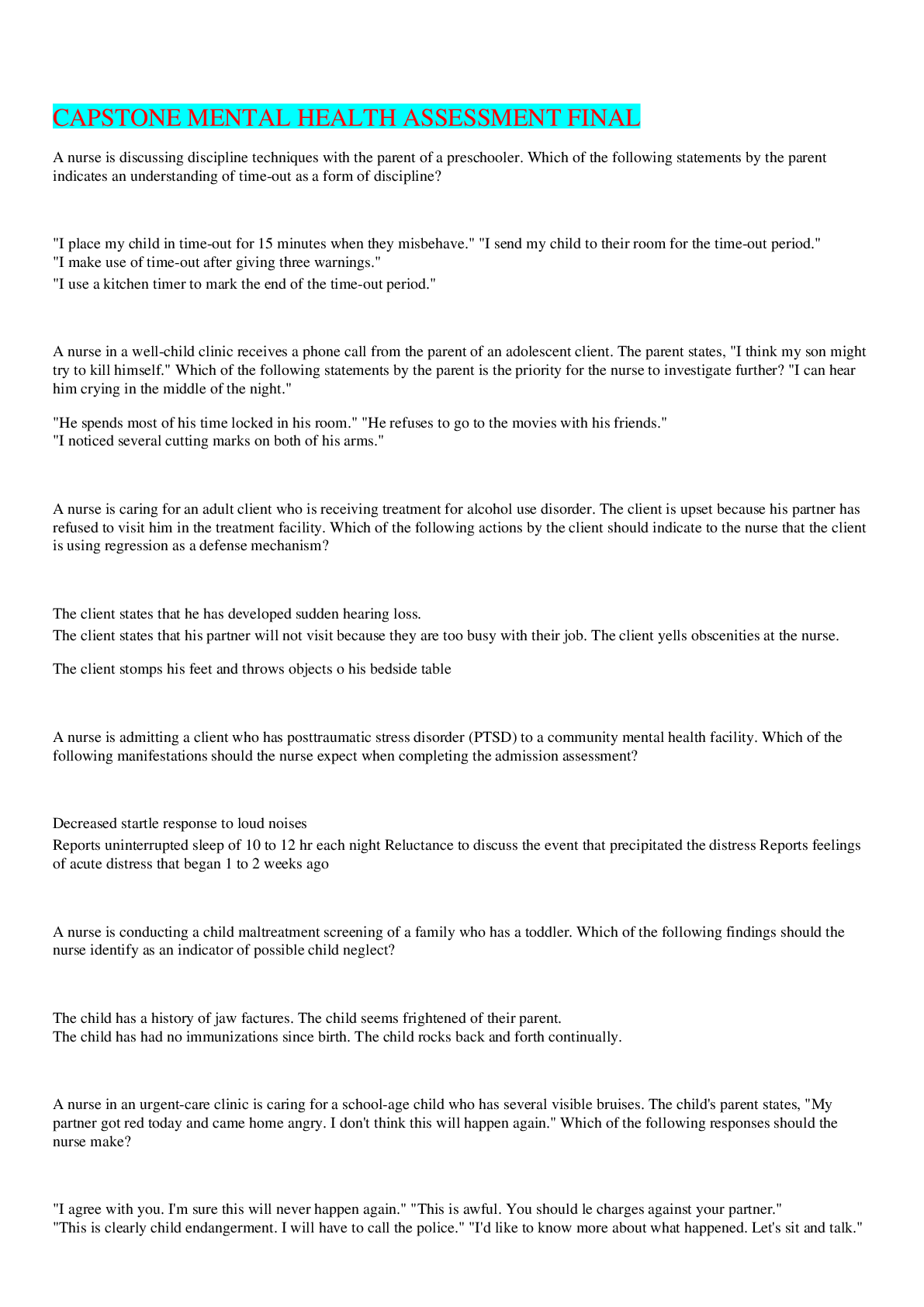Government > EXAM > Central Texas College: GOVT 2305 Lesson 4 Quiz and Answers,100% CORRECT (All)
Central Texas College: GOVT 2305 Lesson 4 Quiz and Answers,100% CORRECT
Document Content and Description Below
Central Texas College: GOVT 2305 Lesson 4 Quiz and Answers Question 1 1 out of 1 points Most parties to a federal case start out in one of the 94 . Selected Answer: d. federal district... courts Answers: a. bankruptcy courts b. circuit courts of appeals c. municipal courts d. federal district courts e. state supreme courts Question 2 1 out of 1 points In order to appeal a case beyond the state supreme court directly to the U.S. Supreme Court, a losing party must . Selected Answer: b. demonstrate there is a federal question at issue Answers: a. start over in the state judicial system b. Question 3 1 out of 1 points demonstrate there is a federal question at issue c. gain approval of its respective state senators d. have approval of the federal court e. show that the U.S. Supreme Court has addressed similar cases in the past Which of the following characteristics is not one of the considerations that is typically used in the selection process for a nominee for an open seat on the U.S. Supreme Court? Selected Answer: b. the nominee’s experience as a trial lawyer Answers: a. demographic considerations such as race or gender of the nominee b. the nominee’s experience as a trial lawyer c. the nominee’s ideological and policy preferences d. the current political environment e. the nominee’s judicial competence Question 4 1 out of 1 points How long do justices of the U.S. Supreme Court serve? Selected Answer: b. for a term of “good behavior” Answers: a. Twenty-year terms b. for a term of “good behavior” c. Four-year terms but may be reappointed d. Eight-year terms e. Four-year terms with no reappointment Question 5 1 out of 1 points What is a factor in how a judge may make a decision? Selected Answer: e. all of the above Answers: a. legal rules and precedents b. changes in circumstances c. ideological attitudes d. external political pressures e. all of the above Question 6 1 out of 1 points Sets of legislative codes, laws, or rules that are enacted by duly authorized lawmaking bodies or offices are broadly known as laws. Selected Answer: e. civil Answers: a. executive b. martial c. common d. case e. civil Question 7 1 out of 1 points A legal system in which judges are responsible for gathering information relevant to deciding a particular case is a(n) . Selected Answer: a. inquisitorial system Answers: a. inquisitorial system b. system of common law c. contest between plaintiff and defendant d. adversarial system e. system of judge-made law Question 8 0 out of 1 points What is the pretrial stage that occurs when the judge finds no reason to dismiss a case and the case then moves forward toward trial? Selected Answer: c. complaint Answers: a. moot court b. discovery c. complaint d. indictment e. litigation Question 9 1 out of 1 points The rules and regulations issued by the Internal Revenue Service, in its duty to implement the tax code, are collectively called law. Selected Answer: b. administrative Answers: a. constitutional b. administrative c. case d. common e. civil Question 10 1 out of 1 points A circuit court of appeals may meet “en banc,” meaning that . Selected Answer: a. the litigant appeals from the three-judge panel to the full circuit court (a panel of 10 or more) Answers: a. the litigant appeals from the three-judge panel to the full circuit court (a panel of 10 or more) b. the entire court must unanimously agree to convene c. the court does not publish its rulings d. it is meeting in secret e. the case is heard without the justices having actually to be present, but the ruling by the attorneys may be appealed to the full court Question 11 1 out of 1 points If a justice agrees with the end result reached by the majority of the court, but disagrees with the reasons offered in the main written opinion, he or she may write a . Selected Answer: a. concurring opinion Answers: a. concurring opinion b. amicus curiae brief c. Writ of certiorari d. majority opinion e. dissenting opinion Question 12 1 out of 1 points In some cases, such as that of O. J. Simpson in the 1990s, the defendant may be acquitted of a murder charge but may also be required in a separate court action to pay a large fine for “wrongful death.” Under what type of law is the wrongful death suit generated? Selected Answer: a. civil law Answers: a. civil law b. common law c. criminal law d. constitutional law e. appeal Question 13 1 out of 1 points Which of the following is not a limitation on the powers of the judicial branch? Selected Answer: d. Federal courts may not hear cases that arise out of state court cases. Answers: a. Federal courts cannot initiate or maintain lawsuits. b. Federal courts can hear lawsuits that constitute only true cases or controversies. c. Federal courts must rely on other branches of government for enforcement. d. Federal courts may not hear cases that arise out of state court cases. e. Federal courts may hear lawsuits from parties that only have proper standing. Question 14 1 out of 1 points If a person damages your private property, you would bring suit under law. Selected Answer: e. private Answers: a. constitutional b. public c. criminal d. common e. private Question 15 1 out of 1 points The U.S. Constitution declares that the constitution is supreme law. The reality of this pronouncement can be quite complicated; but in theory, what impact does this have on state- level courts? Selected Answer: b. State courts must comply with pronouncements from the U.S. Supreme Court over the meaning of the constitution and Bill of Rights. Answers: a. All decisions by the state courts must be reviewed by the federal courts. b. State courts must comply with pronouncements from the U.S. Supreme Court over the meaning of the constitution and Bill of Rights. c. The federal courts have full authority over the state criminal and civil laws as well as the state courts. d. All state courts are subordinate to the federal court system and Congress. e. Question 16 1 out of 1 points This is actually a common law statement from the 1700s that now has no meaning. A federal case that is appealed from a U.S. District Court may be appealed to a . Selected Answer: d. U.S. Court of Appeals Answers: a. the administrative courts b. the state supreme courts c. the Superior Courts d. U.S. Court of Appeals e. U.S. Magistrates Courts Question 17 0 out of 1 points During the nation’s early history, federal trials were conducted by . Selected Answer: d. Supreme Court justices at the Capitol Answers: a. Question 18 1 out of 1 points Supreme Court justices traveling on an assigned circuit b. retired Supreme Court justices on rotation c. members of the senate d. Supreme Court justices at the Capitol e. state Supreme Courts The U. S. Supreme Court hears appeals in . Selected Answer: d. less than 3 percent of the appealed cases Answers: a. only 10 percent of the appealed cases b. all appeals “as of right” c. 75 percent of federally appealed cases d. less than 3 percent of the appealed cases e. 50 percent of the appealed cases Question 19 1 out of 1 points Jurists and scholars that believe changes in circumstances are irrelevant, and that the constitution is limited in scope to what the framers envisioned, support a doctrine referred to as . Selected Answer: d. originalism Answers: a. activism b. broad constructionism c. territorialism d. originalism e. living constitutionalism Question 20 1 out of 1 points Which of the following would be a legitimate case under the “case or controversy” requirement? Selected Answer: d. lawsuits seeking injunction to prevent immediate irreparable harm Answers: a. lawsuits in which the actual conflict is still sometime in the future b. lawsuits in which it is too late to provide any effective remedy c. lawsuits in which the parties have colluded to contrive a result d. lawsuits seeking injunction to prevent immediate irreparable harm e. lawsuits in which jurisdiction has not been properly invoked Question 21 1 out of 1 points A type of trial in which a judge, working on behalf of the government, is responsible for gathering information relevant to the disposition of a case, is referred to as . Selected Answer: c. an inquisitorial trial Answers: a. a civil trial b. a bench trial c. an inquisitorial trial d. judge-made law e. a settlement conference Question 22 1 out of 1 points When one private party contests another and the lawsuit or action is brought before a judge in a court of law, the process is referred to collectively as . Selected Answer: a. litigation Answers: a. litigation b. civil discourse c. prosecution d. appeal e. indictment Question 23 1 out of 1 points The formal document, issued by the grand jury, which authorizes the government to proceed to trial against the defendant is called the . Selected Answer: d. indictment Answers: a. subpoena b. plea bargain c. arrest d. indictment e. discovery Question 24 1 out of 1 points Judge-made law handed down through judicial opinions, which establish slowly evolving precedents over time, is referred to as laws. Selected Answer: d. common Answers: a. legislative b. martial c. civil d. common e. preemptive Question 25 1 out of 1 points Growing in popularity and use is the “Missouri Plan” for selecting judges at the state level. What are the steps in this process? Selected Answer: b. A judicial nominating committee chooses three judicial candidates based on merit; the governor appoints one from the list, and after two years the judge stands for election by the voters. Answers: a. A non-partisan commission appoints the judge, and after a two-year trial service the governor may be appointed for life. b. A judicial nominating committee chooses three judicial candidates based on merit; the governor appoints one from the list, and after two years the judge stands for election by the voters. c. The state supreme court convenes a committee comprised of three of its justices, who then choose the new judge based on merit issues. d. A judge is appointed by the governor through a partisan process but later must run for reelection as a nonpartisan candidate. e. The legislature chooses the judge by a three-fourths vote and the judge is then appointed for a life term. [Show More]
Last updated: 1 year ago
Preview 1 out of 17 pages
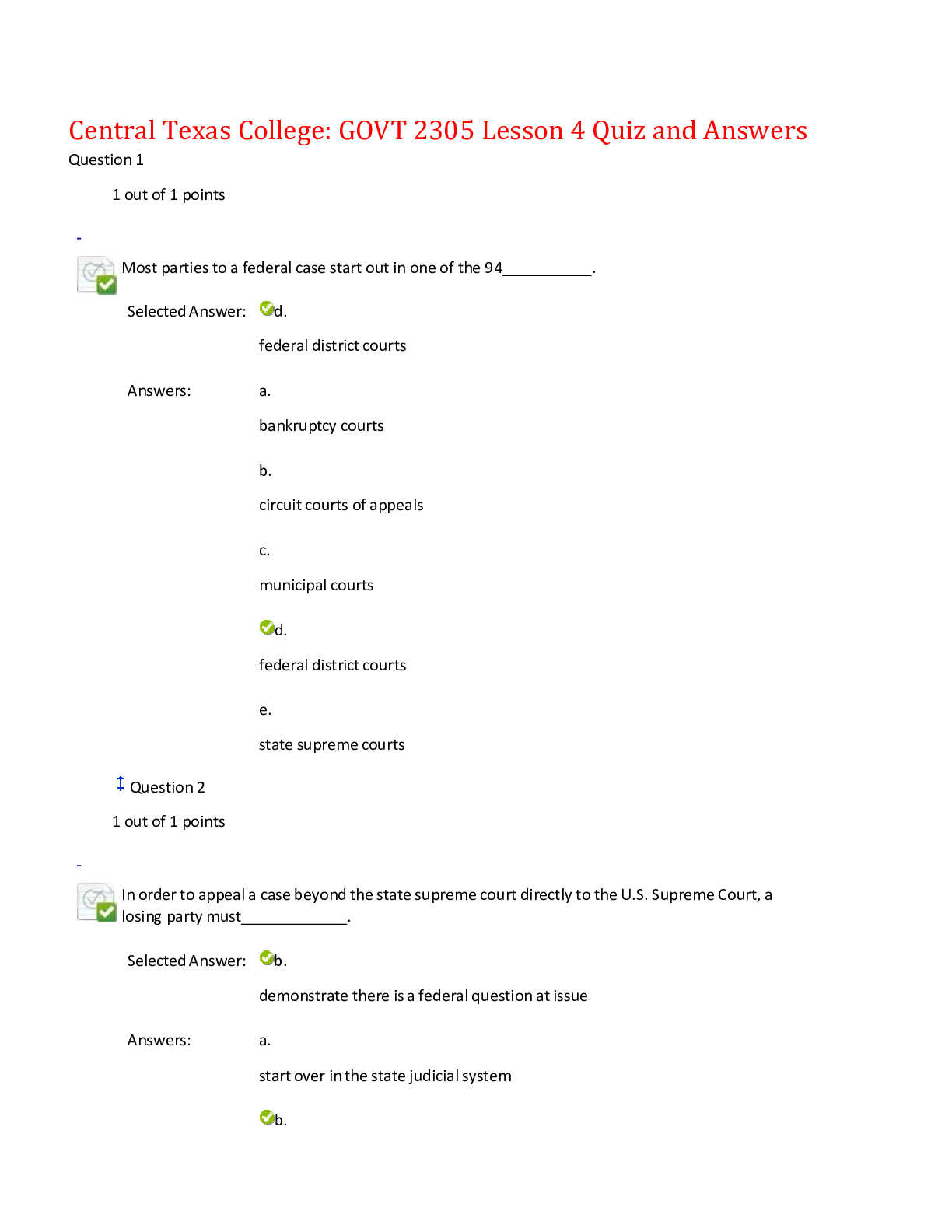
Reviews( 0 )
Document information
Connected school, study & course
About the document
Uploaded On
Aug 12, 2022
Number of pages
17
Written in
Additional information
This document has been written for:
Uploaded
Aug 12, 2022
Downloads
0
Views
58
